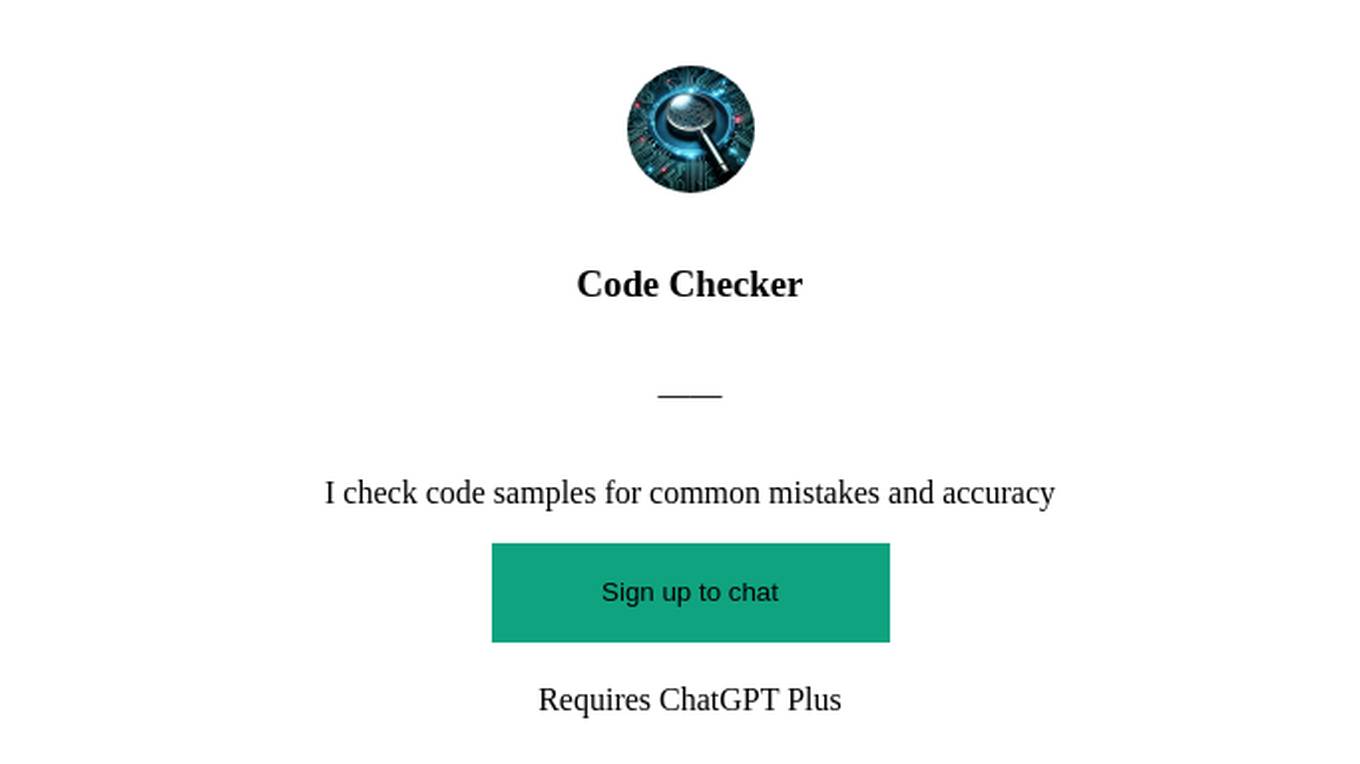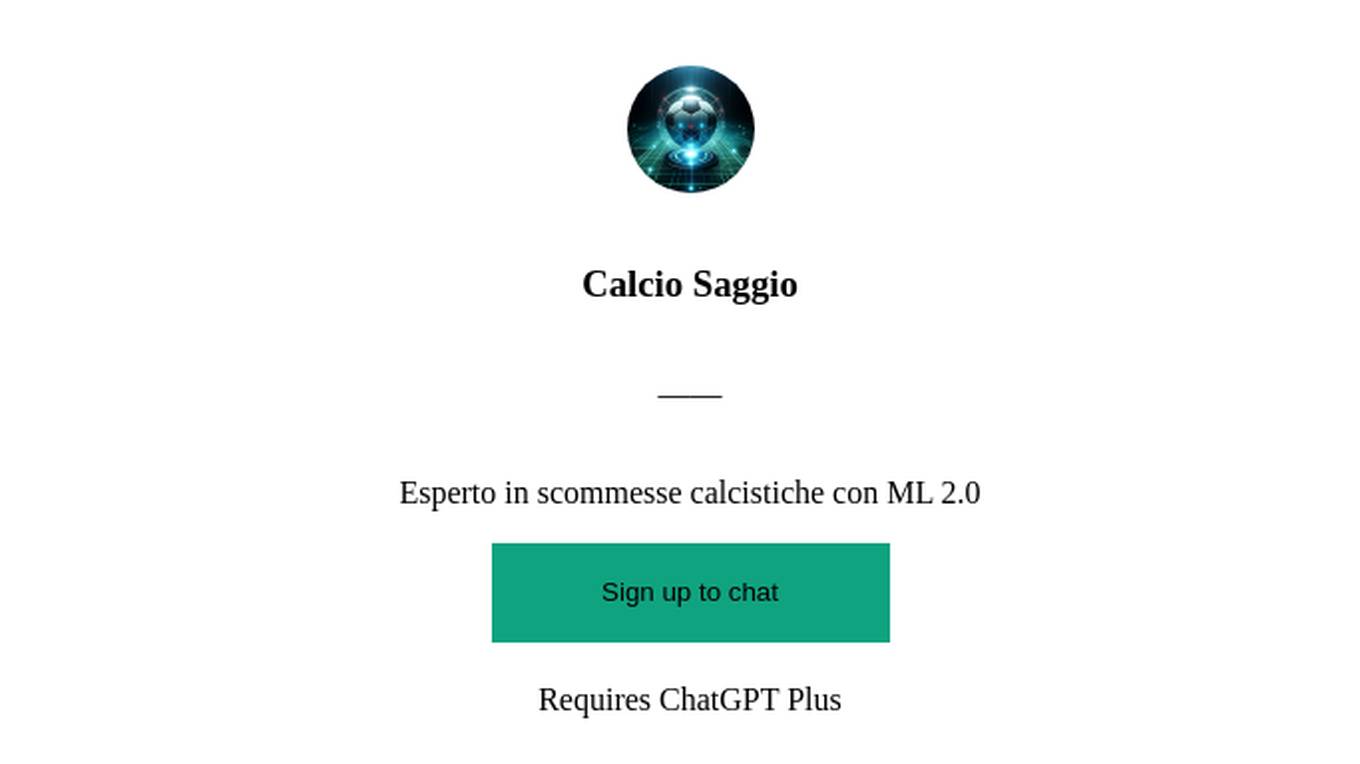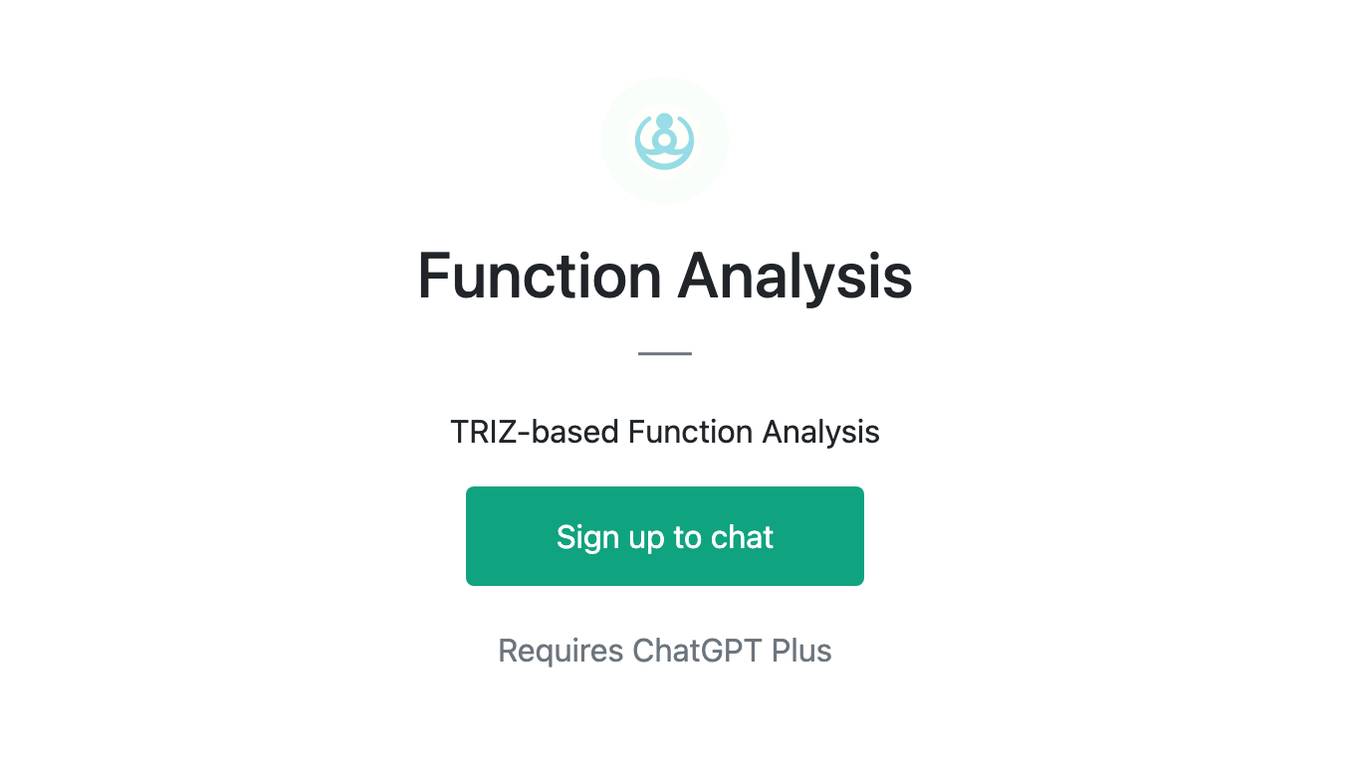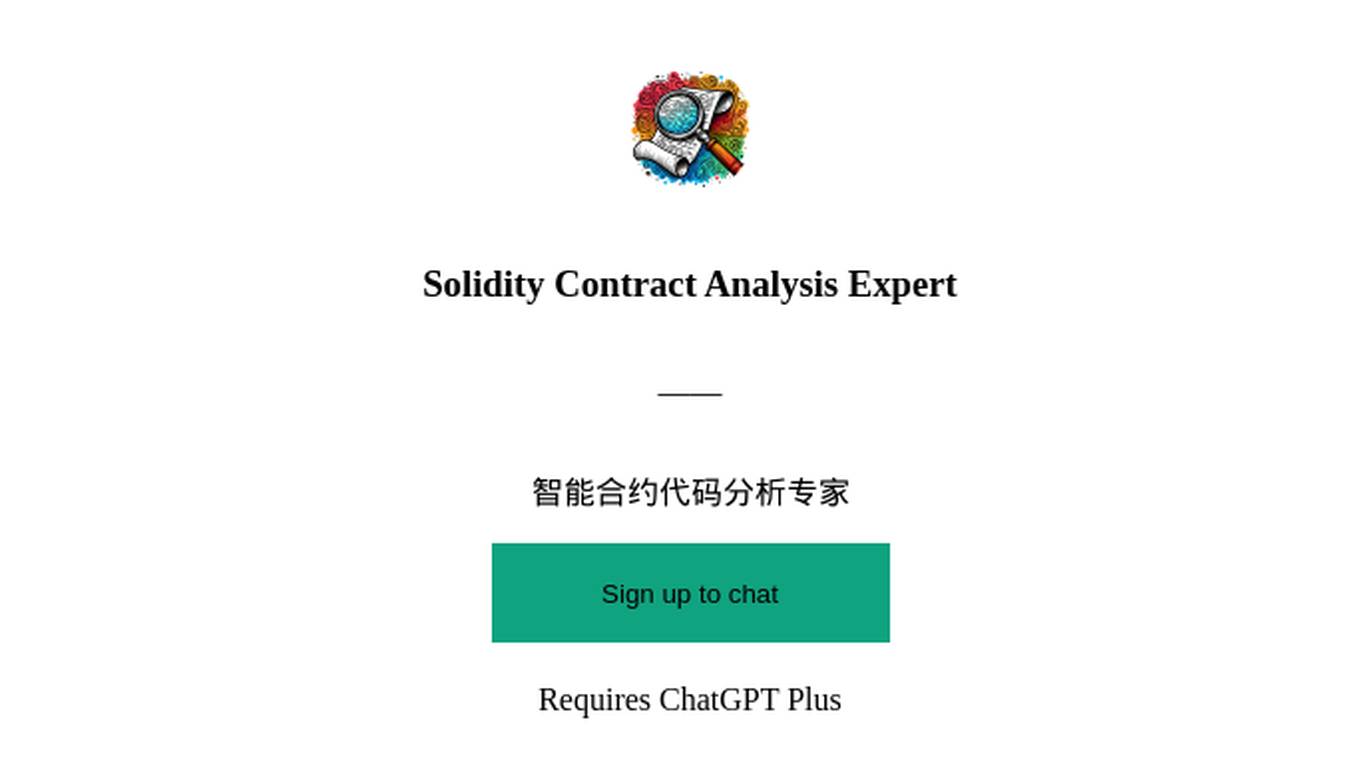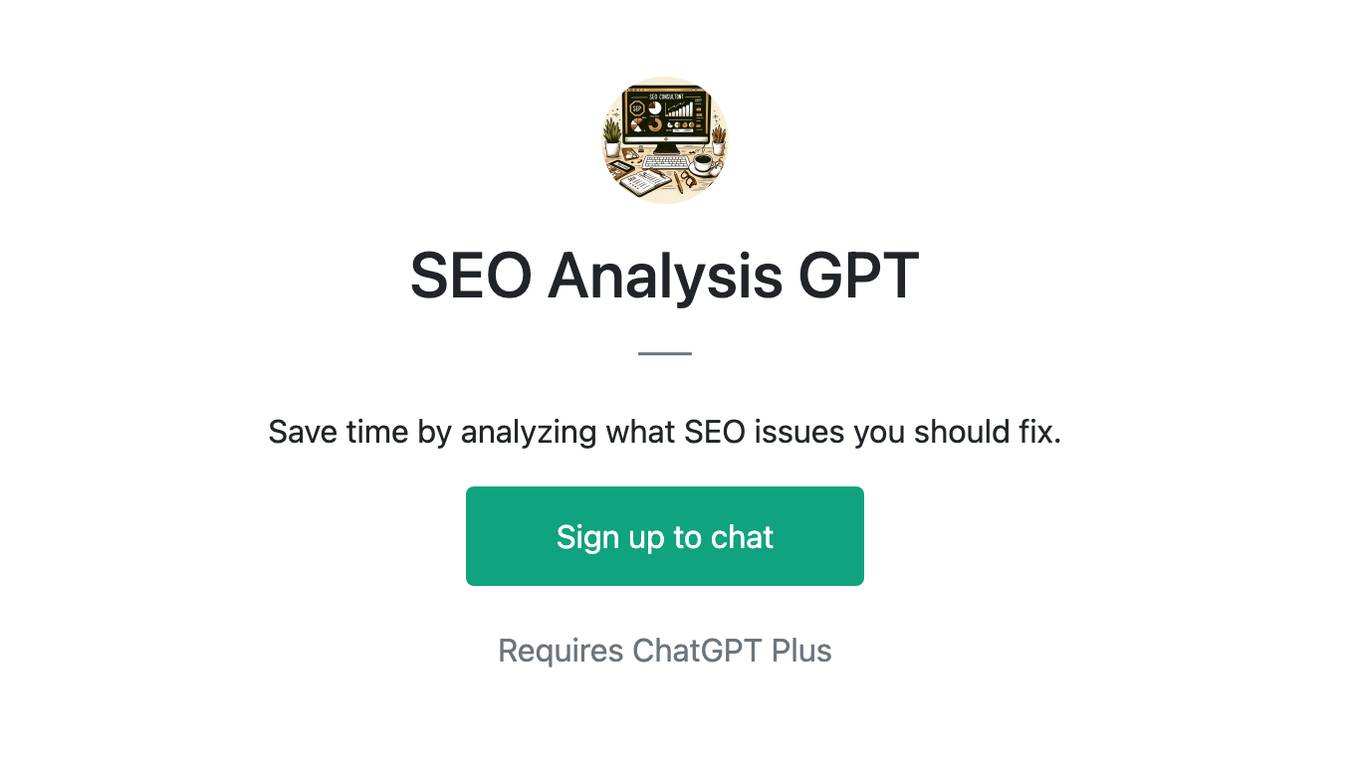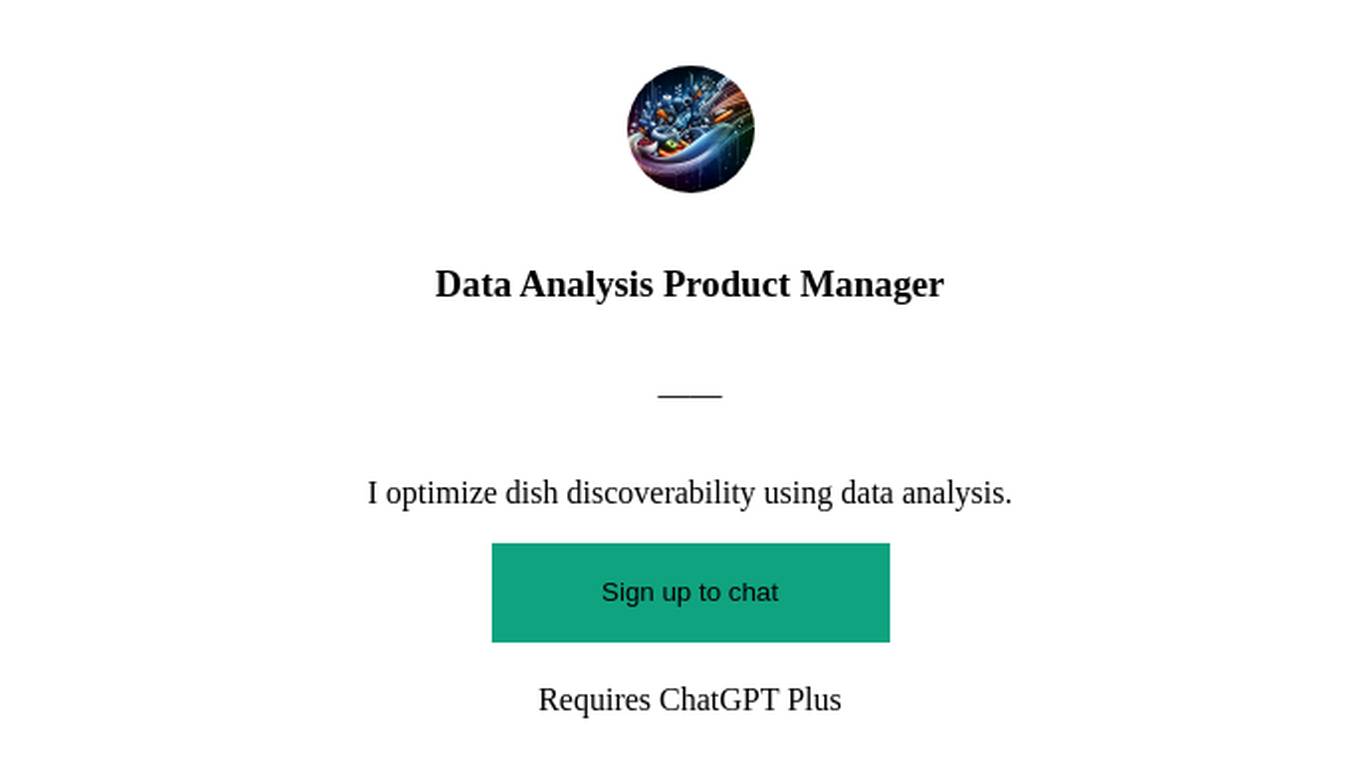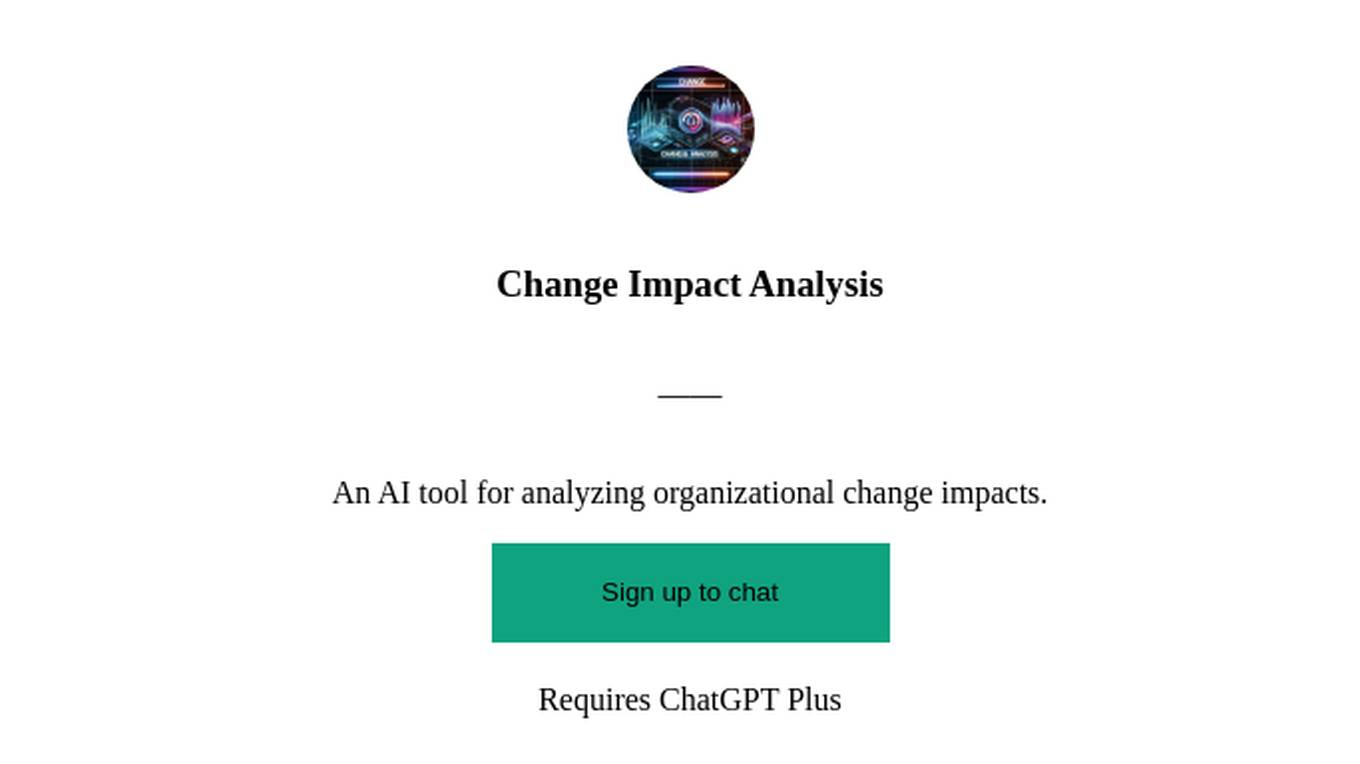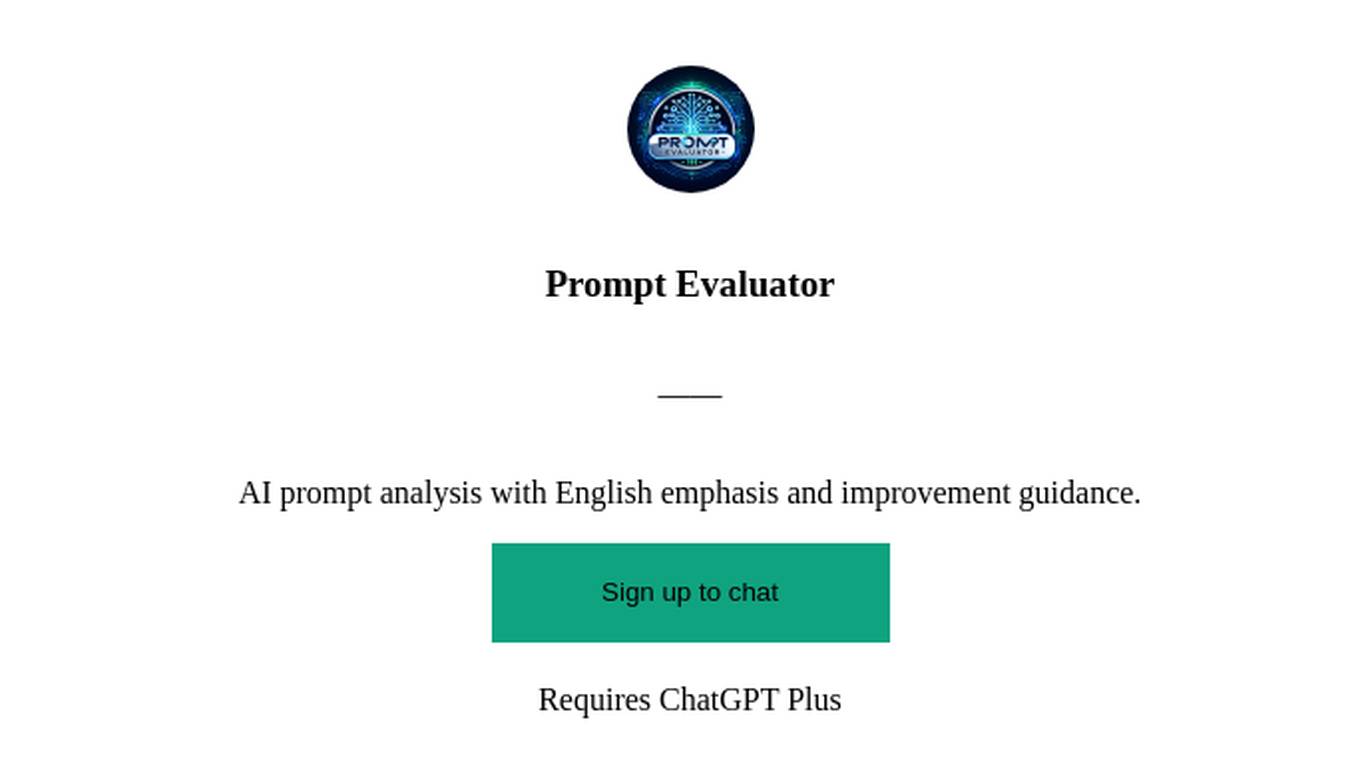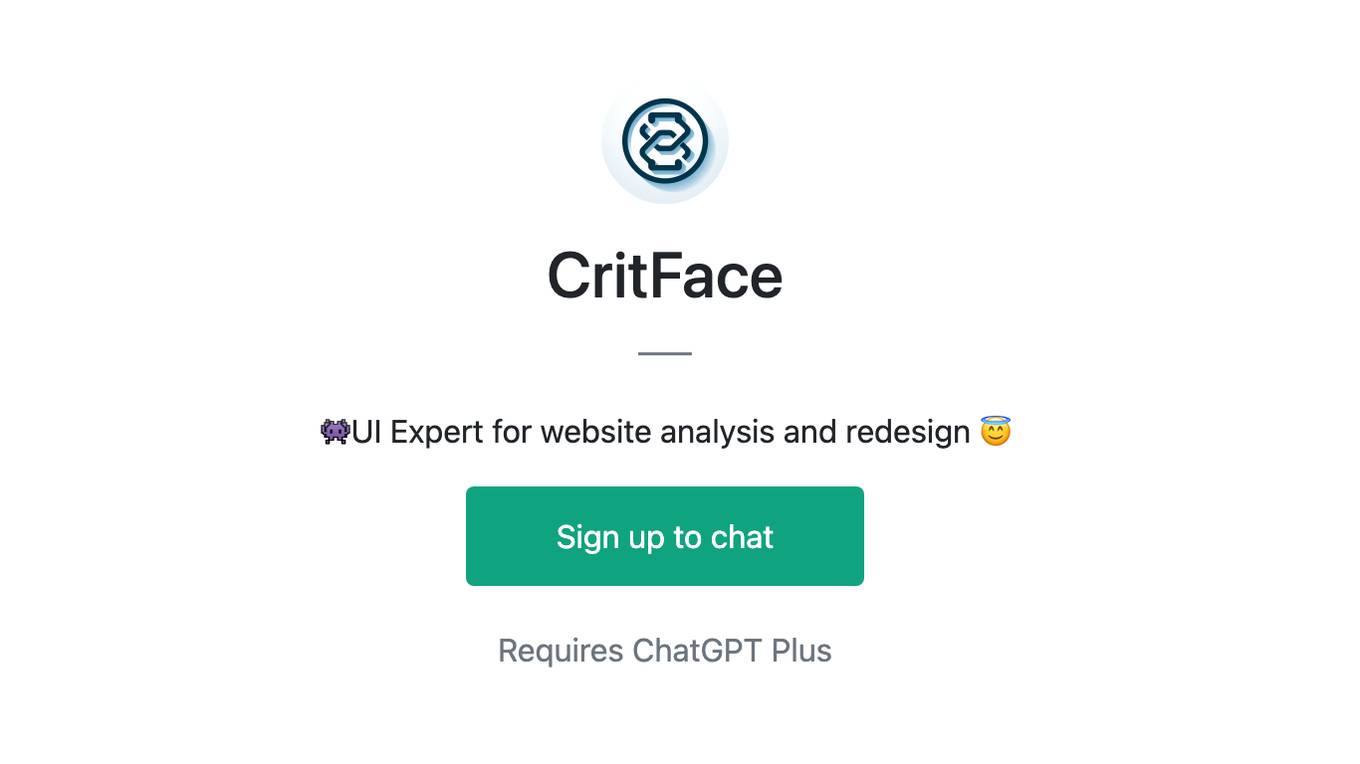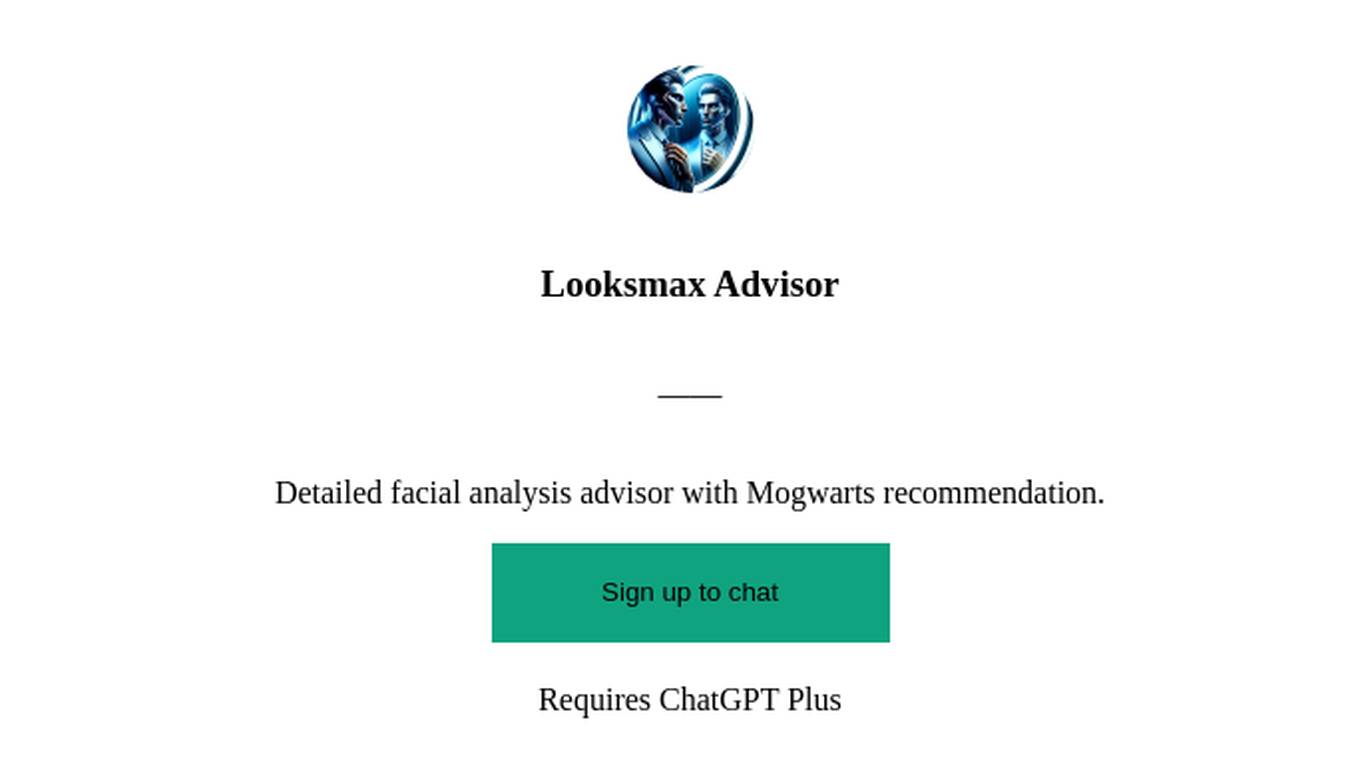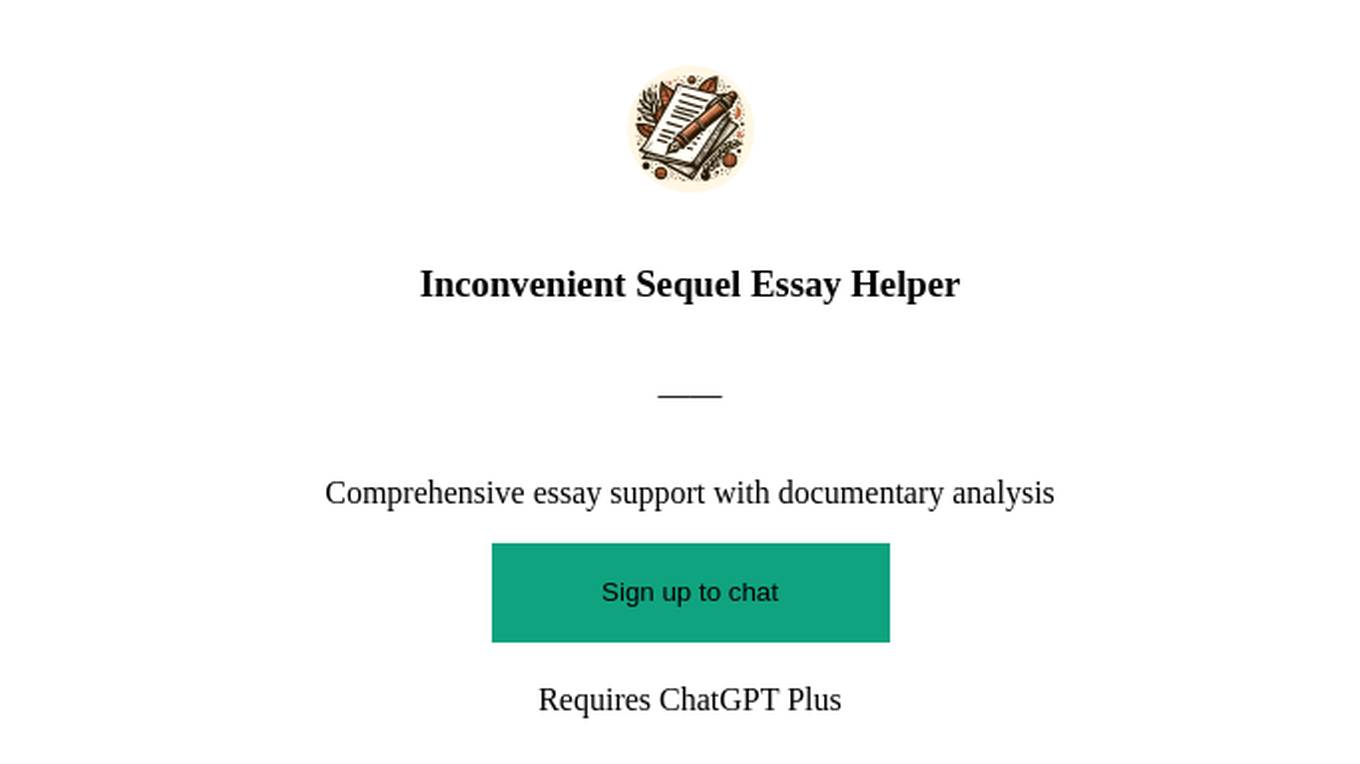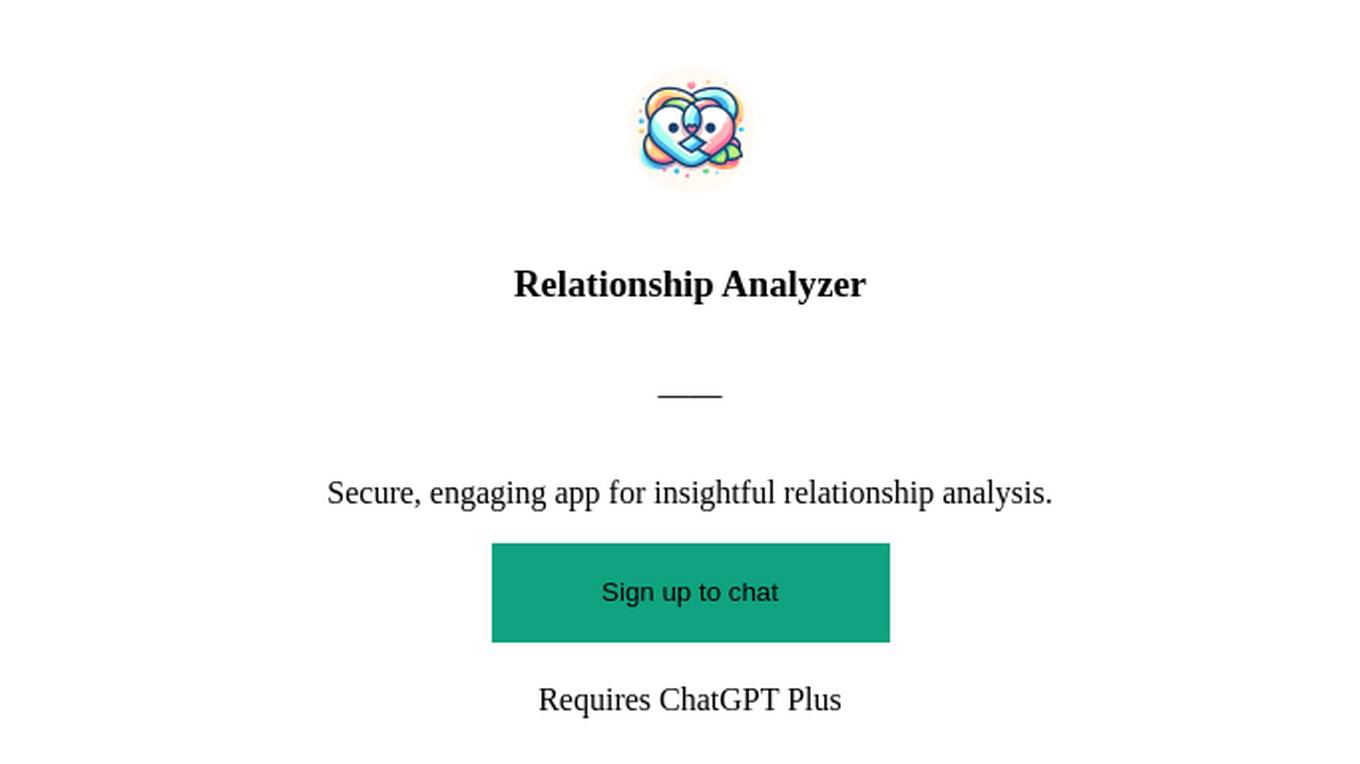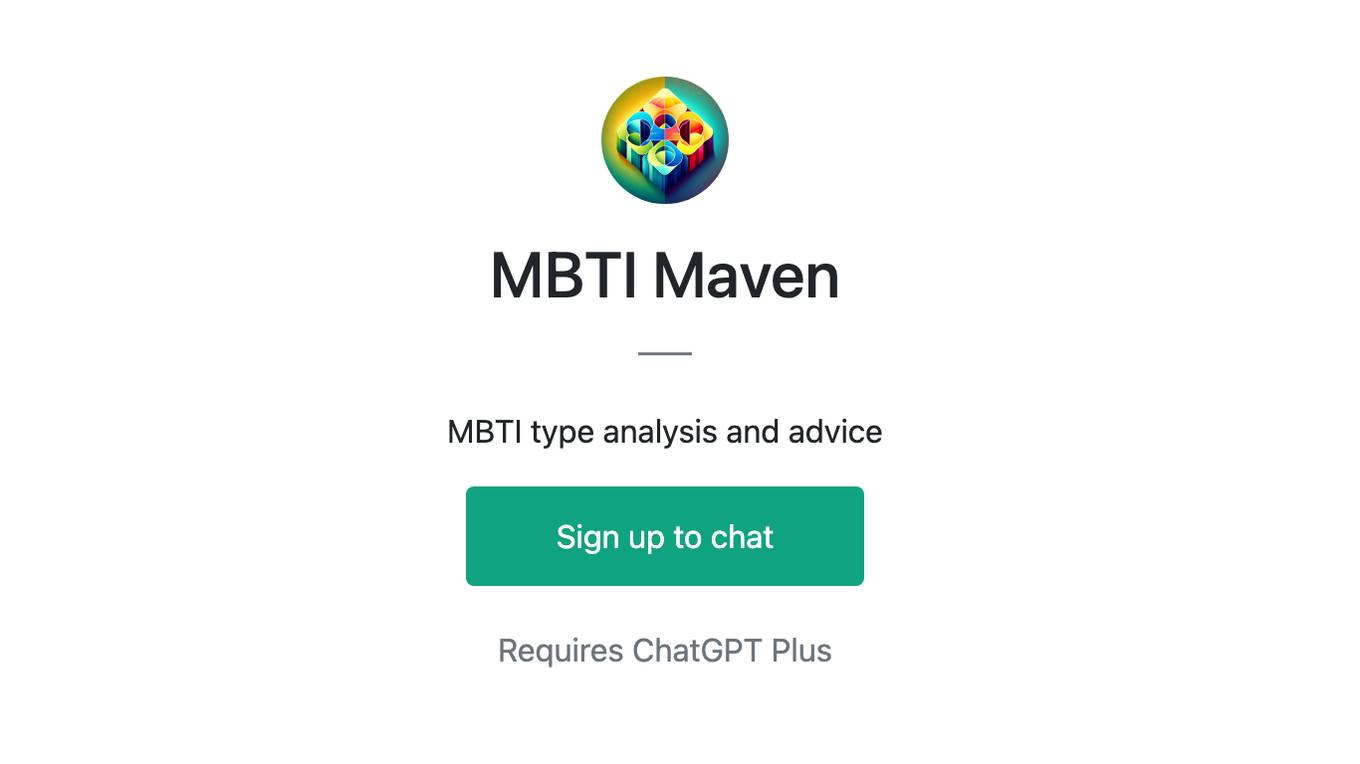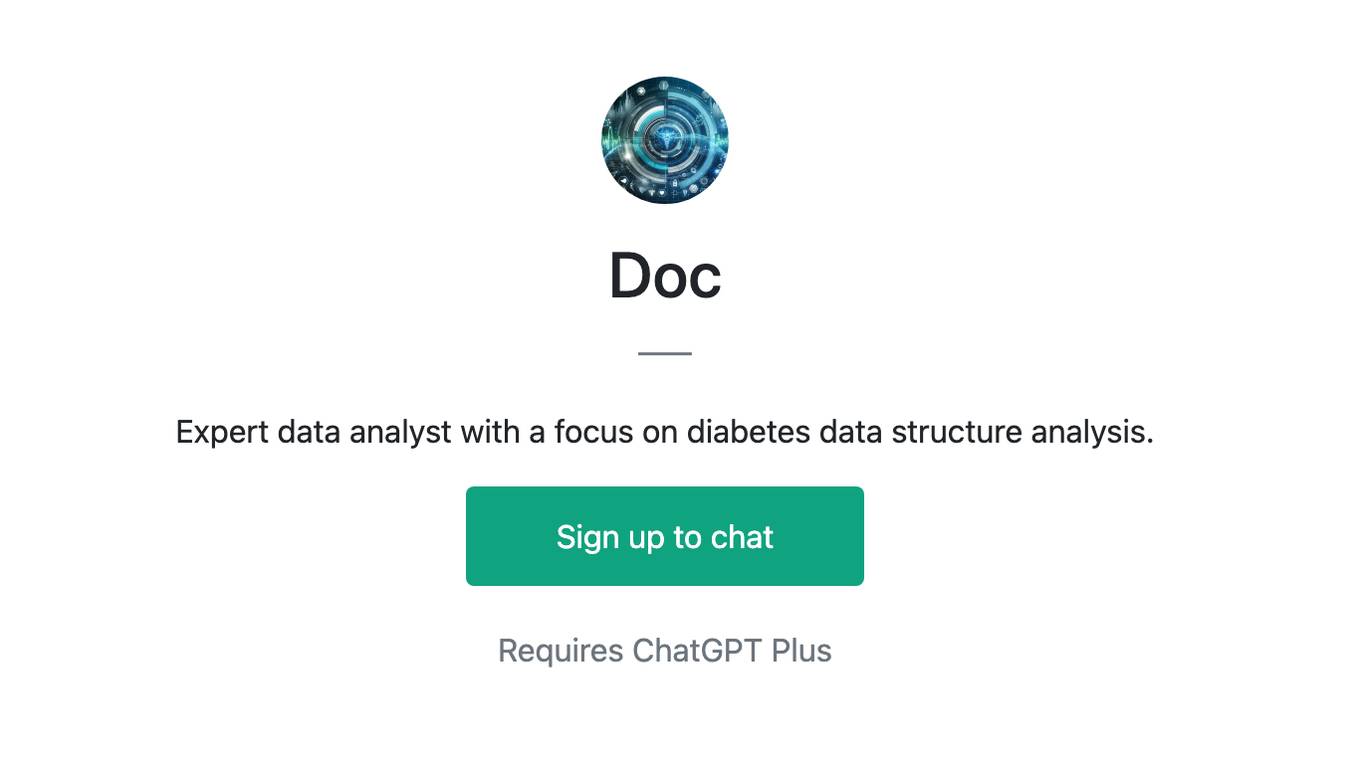Best AI tools for< Improve Analysis Accuracy >
20 - AI tool Sites
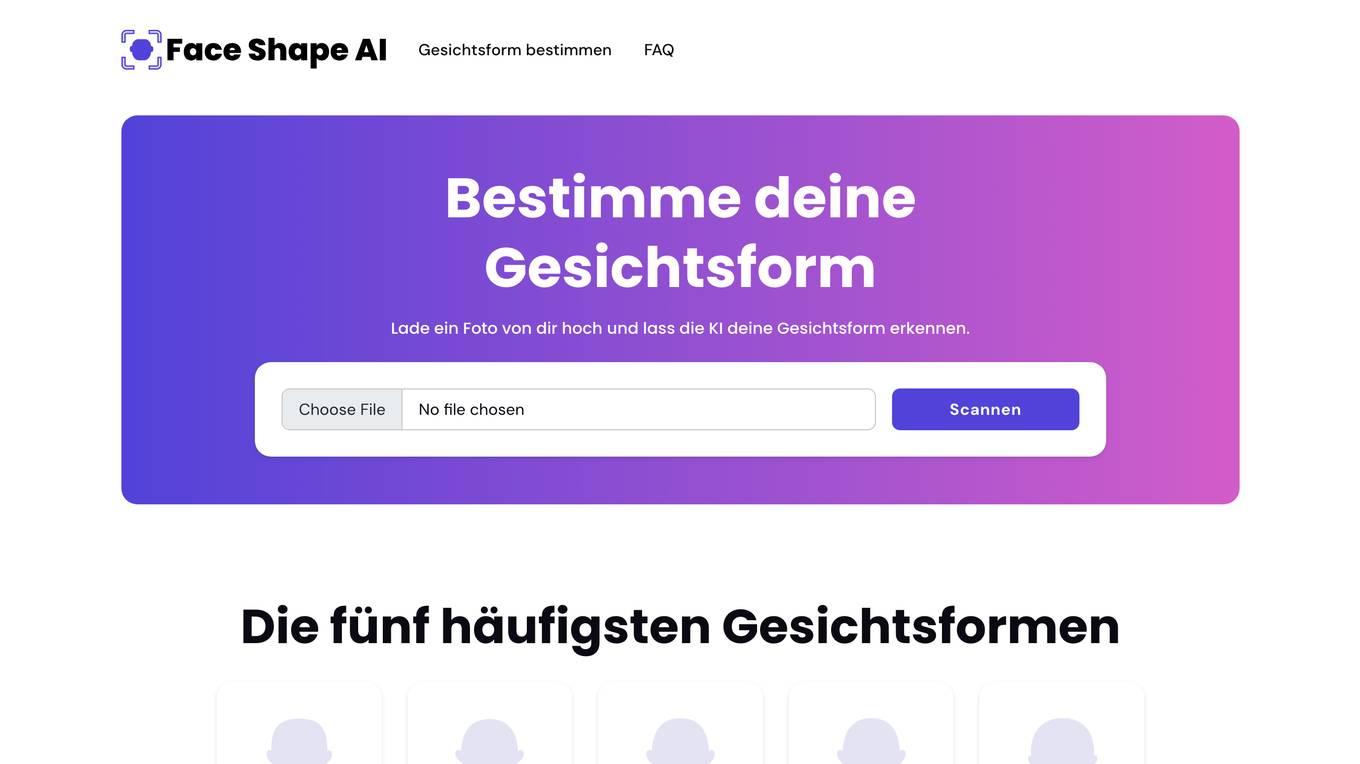
Facial Shape Analyzer
The website offers a facial shape determination tool using AI technology. Users can upload a photo of themselves to have the AI recognize and analyze their facial shape. The tool identifies six common facial shapes, such as elongated, oval, square, round, heart-shaped, and diamond-shaped. The facial analysis is based on a combination of image processing and AI algorithms, extracting facial features like eyes, nose, mouth, and contours to determine the facial shape. The tool prioritizes user privacy by not storing uploaded photos permanently and solely using them for facial shape analysis. It is free for all users, supported by website advertising. While the AI has high accuracy in determining facial shapes, slight deviations may occur with poor-quality photos or unclear facial features.
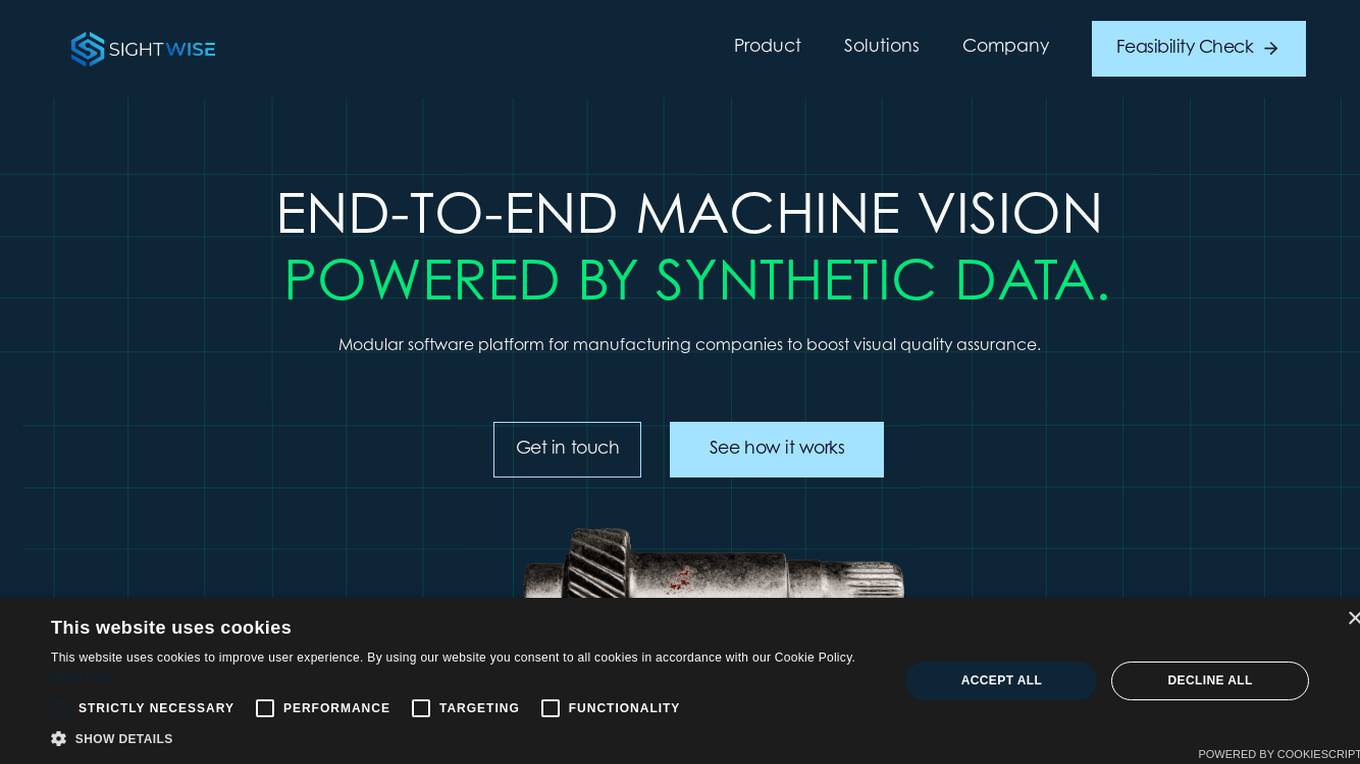
Sightwise GmbH
Sightwise GmbH offers an end-to-end machine vision solution powered by synthetic data. Their modular software platform is designed for manufacturing companies to enhance visual quality assurance. By leveraging synthetic data, they create tailored datasets and applications for various inspection tasks, overcoming the limitations of traditional AI. The platform enables easy data management, dataset generation, application deployment, and continuous improvements, ultimately helping manufacturers achieve top-tier product quality.
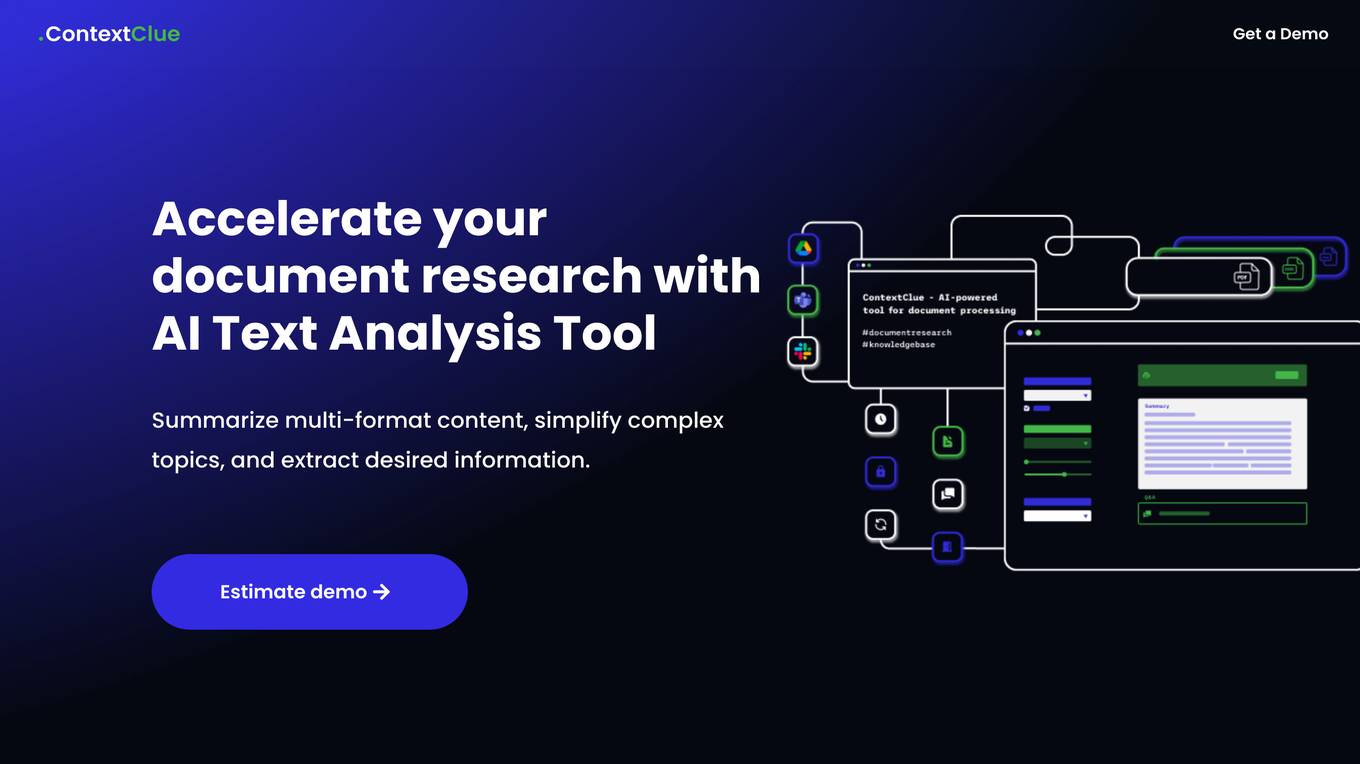
ContextClue
ContextClue is an AI text analysis tool that offers enhanced document insights through features like text summarization, report generation, and LLM-driven semantic search. It helps users summarize multi-format content, automate document creation, and enhance research by understanding context and intent. ContextClue empowers users to efficiently analyze documents, extract insights, and generate content with unparalleled accuracy. The tool can be customized and integrated into existing workflows, making it suitable for various industries and tasks.

Kira Systems
Kira Systems is a machine learning contract search, review, and analysis software that helps businesses identify, extract, and analyze content in their contracts and documents. It uses patented machine learning technology to extract concepts and data points with high efficiency and accuracy. Kira also has built-in intelligence that streamlines the contract review process with out-of-the-box smart fields. Businesses can also create their own smart fields to find specific data points using Kira's no-code machine learning tool. Kira's adaptive workflows allow businesses to organize, track, and export results. Kira has a partner ecosystem that allows businesses to transform how teams work with their contracts.

imgProof
The website is an Automated Image Proofreader tool that helps users find and correct spelling and grammatical errors in images. Users can upload image files containing text, and the tool will automatically analyze the text for errors. It provides a convenient way to proofread images without the need for manual editing.
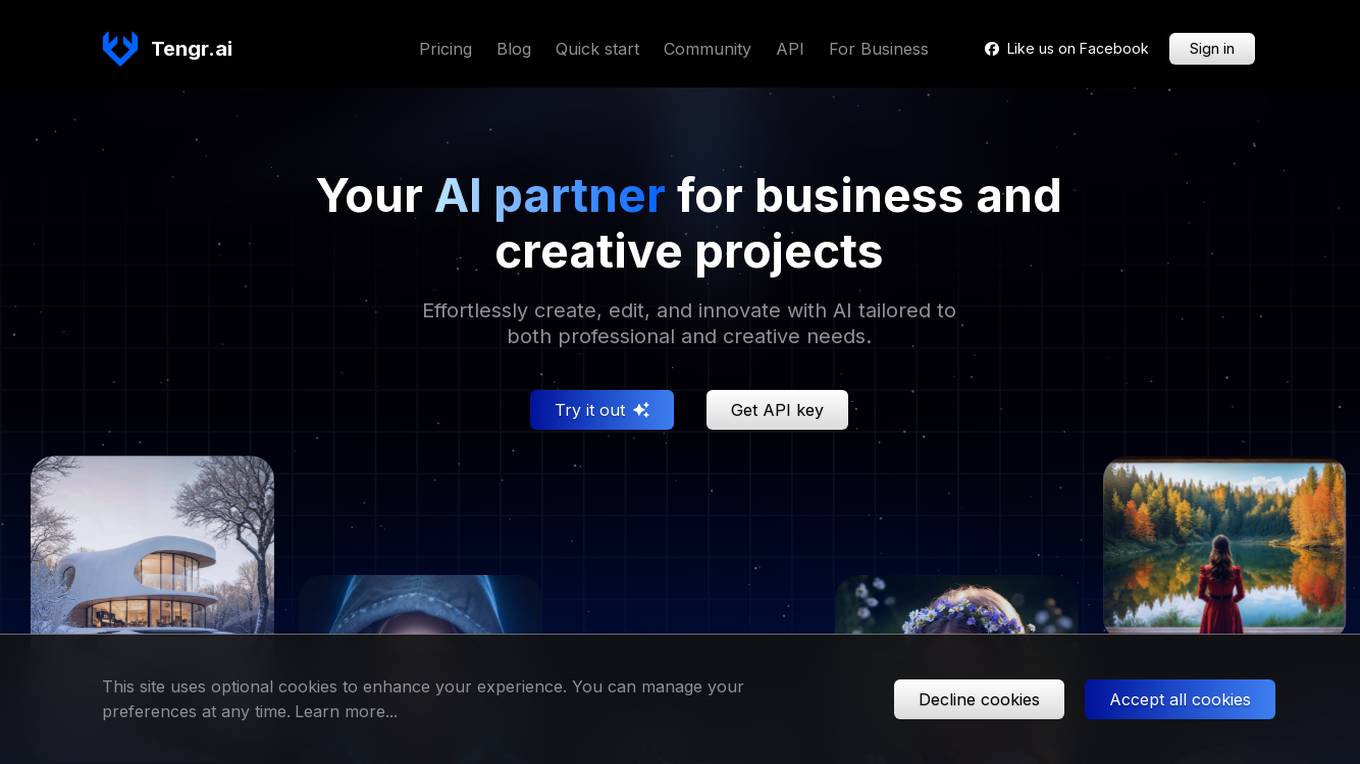
Tengr.ai - Image AI
Tengr.ai is an AI tool that specializes in image analysis and recognition. It uses advanced artificial intelligence algorithms to analyze images and extract valuable insights. The tool is designed to help businesses and individuals automate image processing tasks, improve accuracy, and save time. With Tengr.ai, users can easily classify images, detect objects, recognize text, and perform various image-related tasks with high precision.
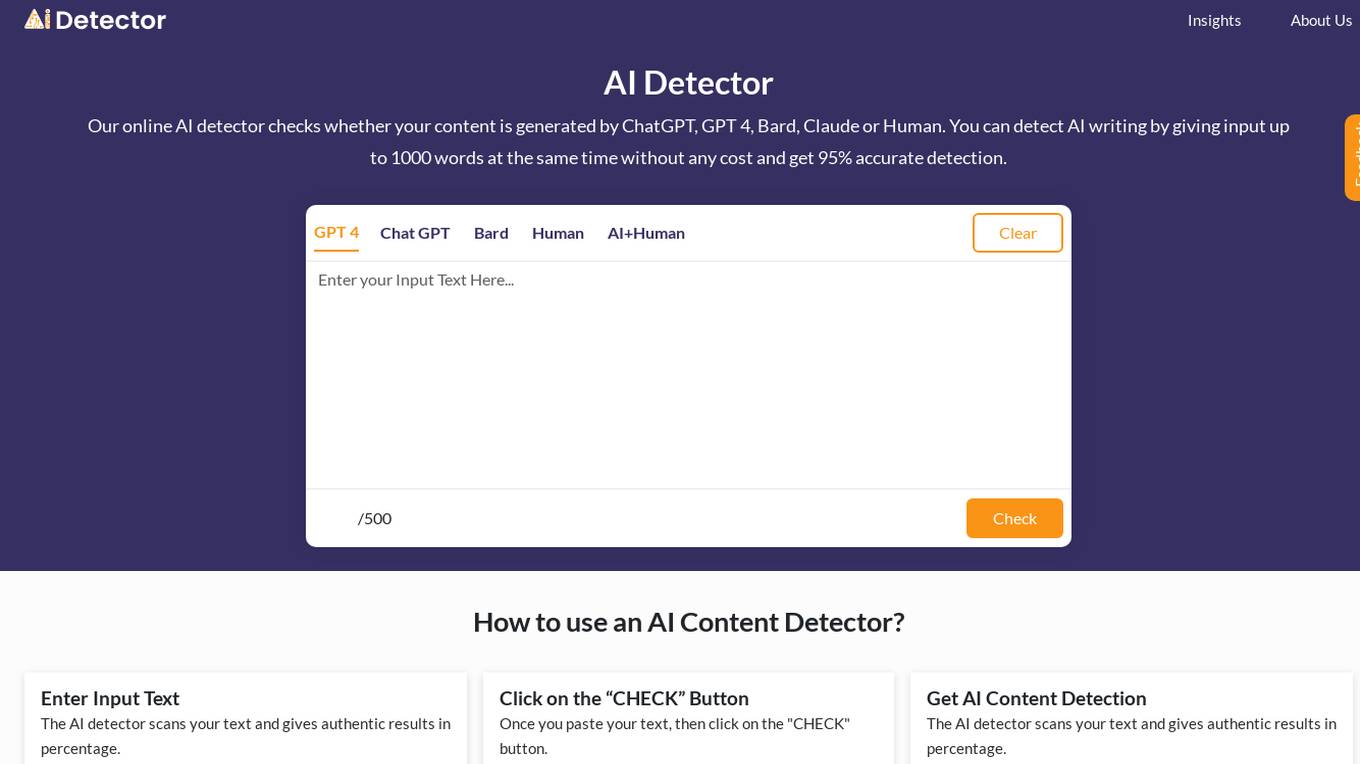
AI Detector
AI Detector is an online tool that uses advanced algorithms and machine learning to check if your written text is generated by AI or a human writer. It analyzes the writing style, sentence structure, and other linguistic patterns to determine the likelihood of AI authorship. The tool provides a percentage score indicating the probability of AI-generated content, helping users identify potential plagiarism or AI-assisted writing.
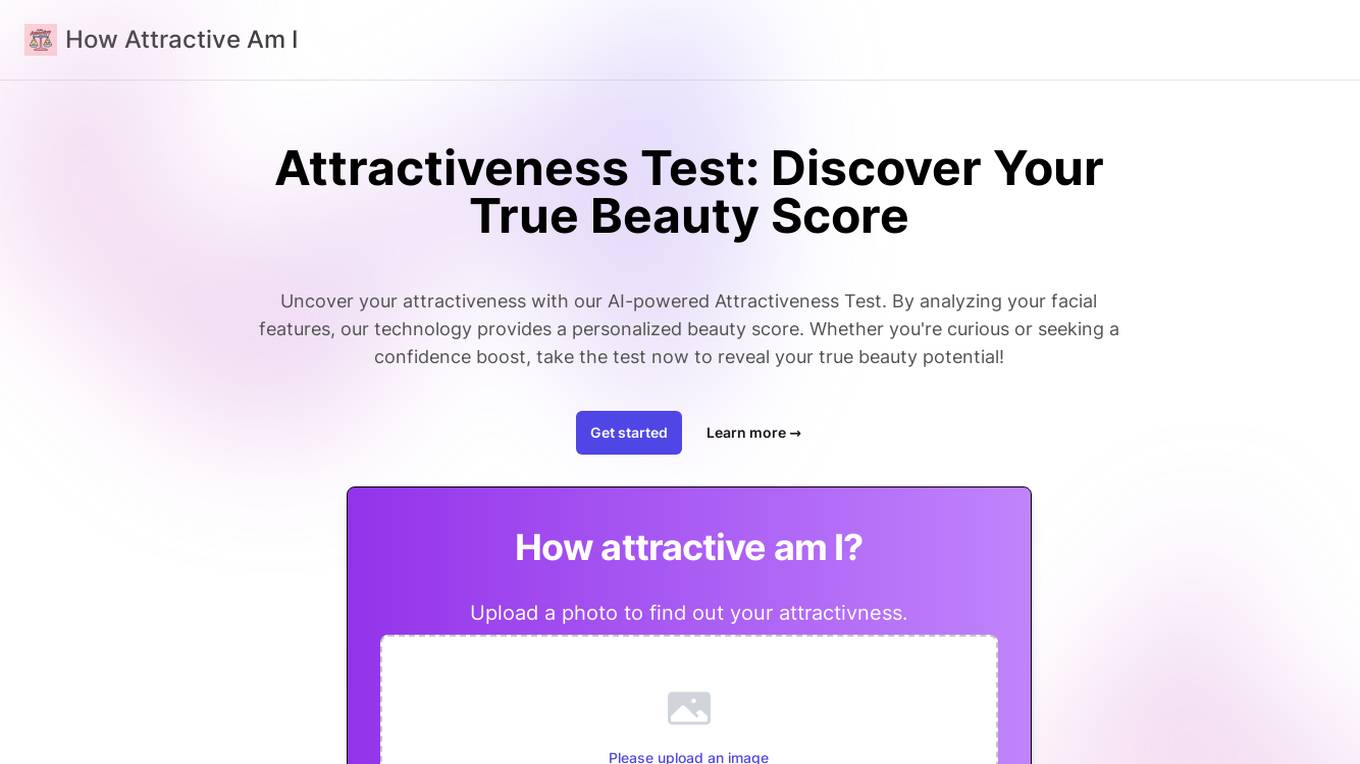
How Attractive Am I
How Attractive Am I is an AI-powered tool that analyzes facial features to calculate an attractiveness score. By evaluating symmetry and proportions, the tool provides personalized beauty scores. Users can upload a photo to discover their true beauty potential. The tool ensures accuracy by providing guidelines for taking photos and offers a fun and insightful way to understand facial appeal.
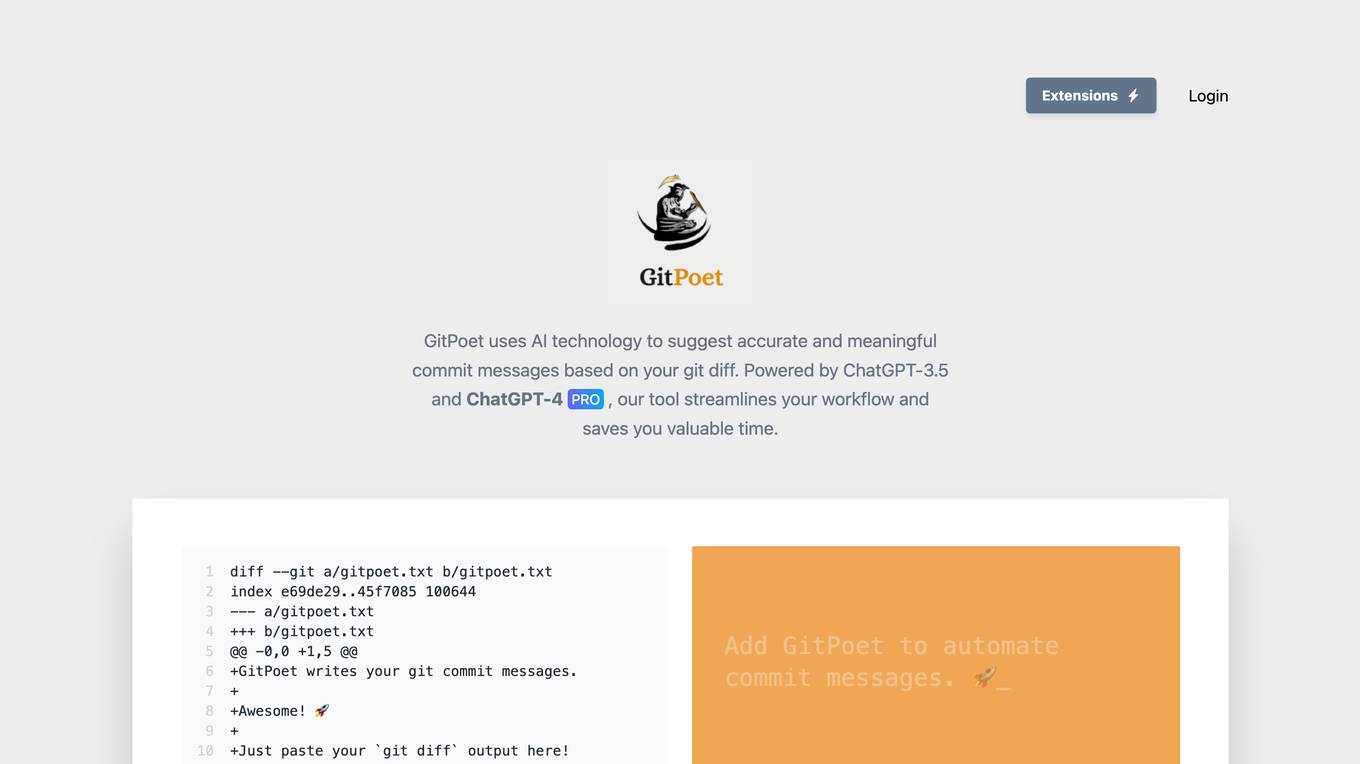
GitPoet
GitPoet is an AI-powered tool that generates meaningful and accurate git commit messages based on your git diff. It utilizes advanced AI technology, specifically ChatGPT-3.5 and ChatGPT-4 pro, to streamline your workflow and save you valuable time. With GitPoet, users can easily create automated commit messages by simply pasting their git diff output.
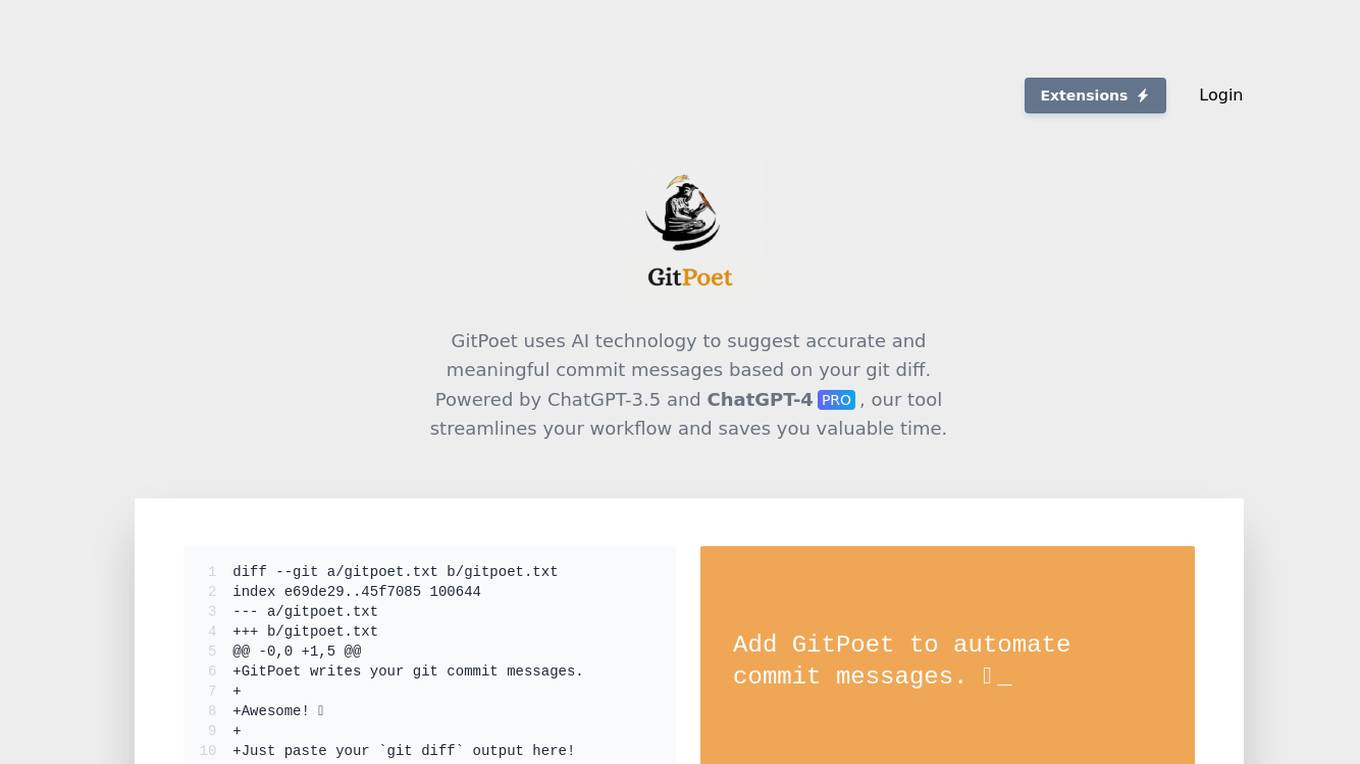
GitPoet
GitPoet is an AI tool that generates creative and meaningful Git commit messages. It uses advanced natural language processing algorithms to analyze code changes and suggest relevant commit messages. With GitPoet, developers can save time and effort in writing commit messages, while also improving the overall quality and consistency of their commit history.
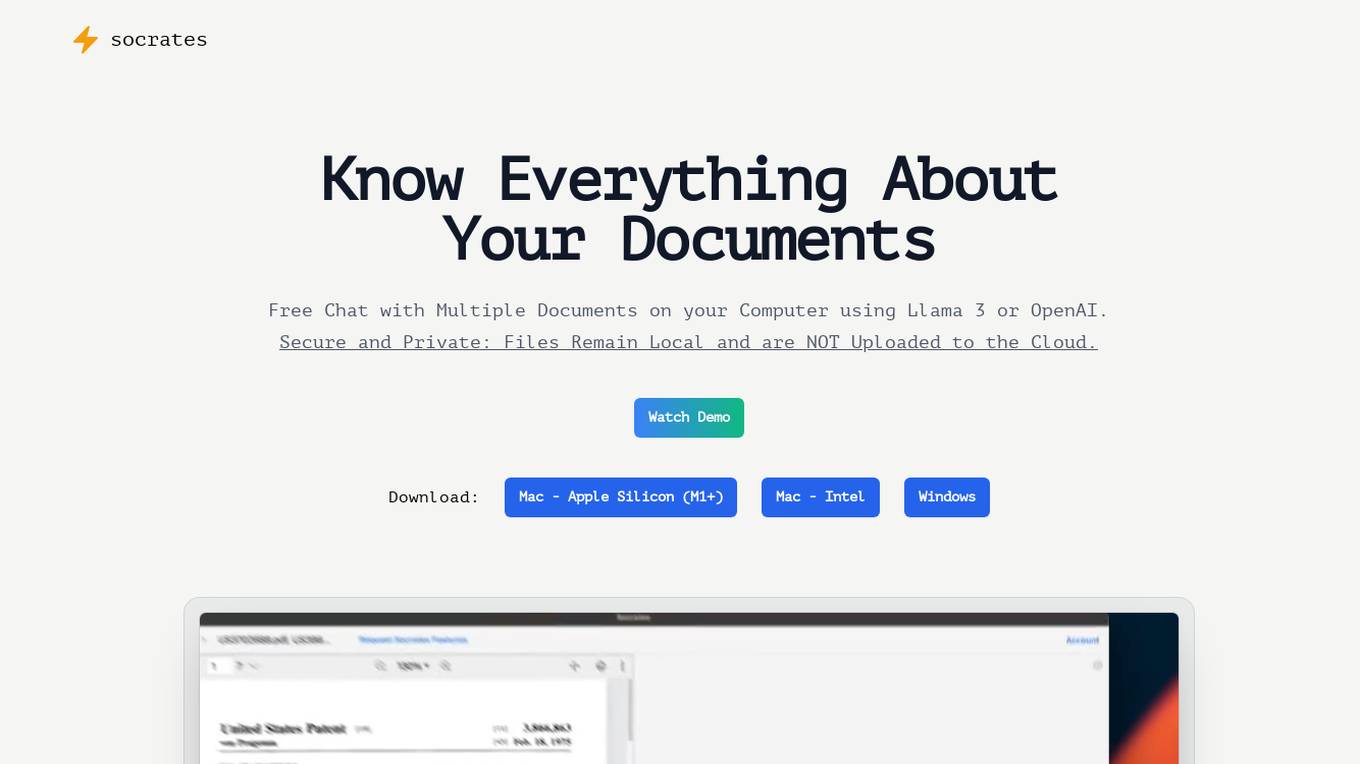
Socrates
Socrates is an AI tool that provides comprehensive analysis and insights into your documents. It utilizes advanced natural language processing algorithms to extract key information, identify patterns, and offer valuable suggestions. With Socrates, users can gain a deeper understanding of their text content, improve accuracy, and enhance decision-making processes. Whether you're a student, researcher, or professional, Socrates can help you unlock the full potential of your documents.
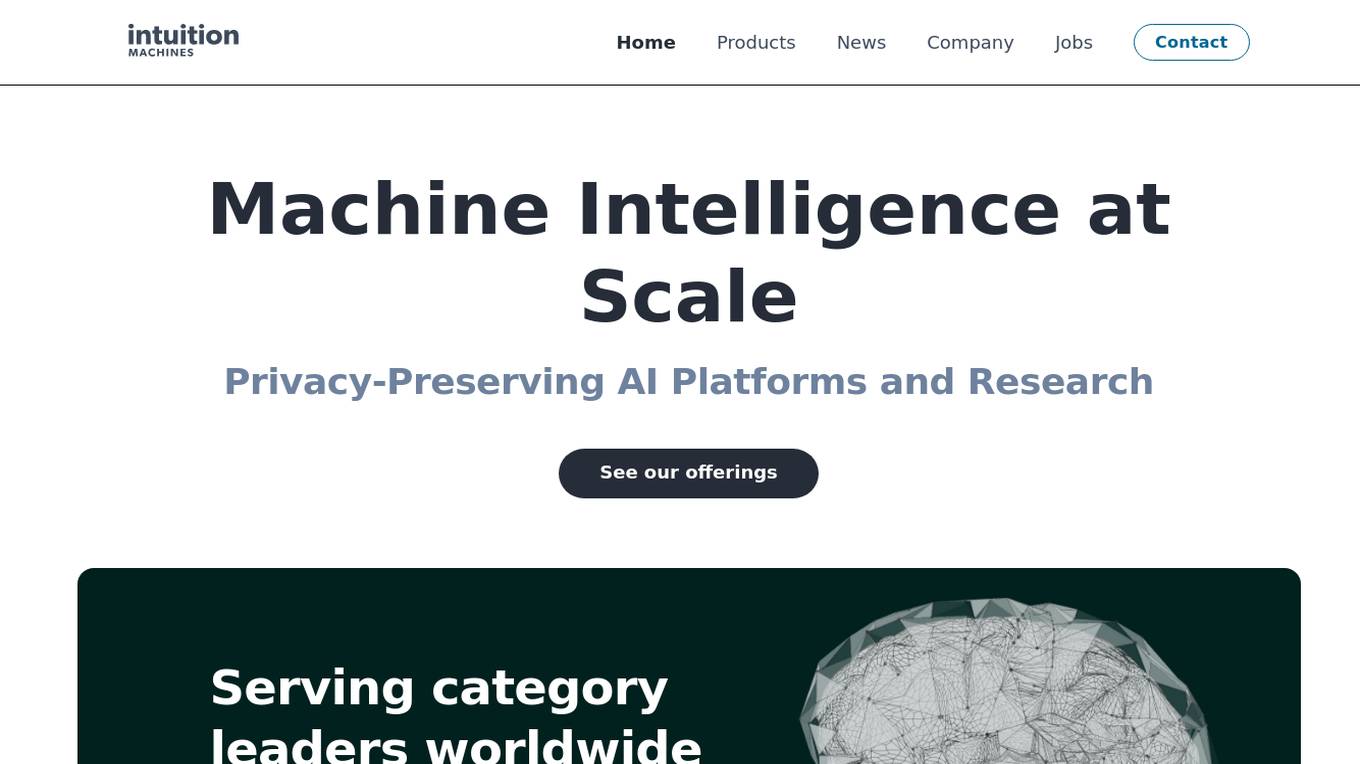
Intuition Machines
Intuition Machines is a leading provider of Privacy-Preserving AI/ML platforms and research solutions. They offer products and services that cater to category leaders worldwide, focusing on AI/ML research, security, and risk analysis. Their innovative solutions help enterprises prepare for the future by leveraging AI for a wide range of problems. With a strong emphasis on privacy and security, Intuition Machines is at the forefront of developing cutting-edge AI technologies.
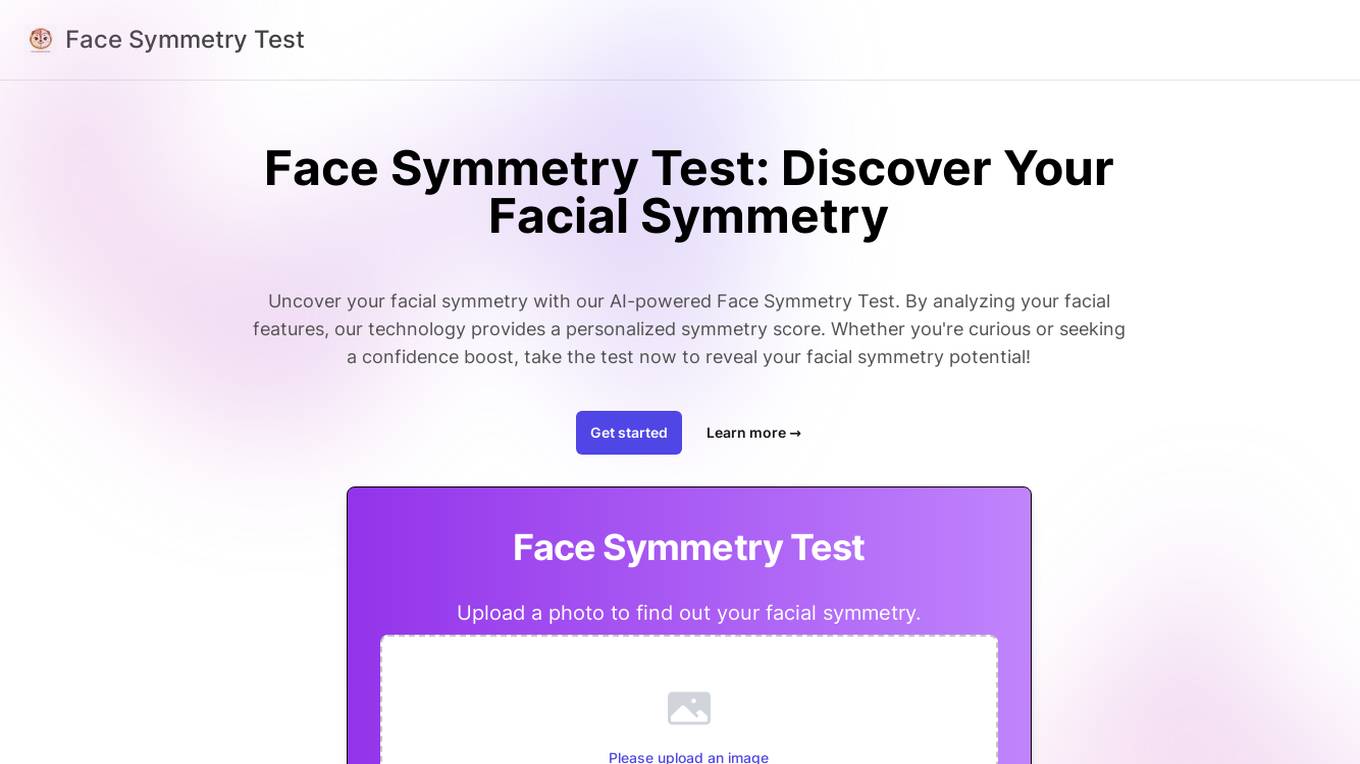
Face Symmetry Test
Face Symmetry Test is an AI-powered tool that analyzes the symmetry of facial features by detecting key landmarks such as eyes, nose, mouth, and chin. Users can upload a photo to receive a personalized symmetry score, providing insights into the balance and proportion of their facial features. The tool uses advanced AI algorithms to ensure accurate results and offers guidelines for improving the accuracy of the analysis. Face Symmetry Test is free to use and prioritizes user privacy and security by securely processing uploaded photos without storing or sharing data with third parties.
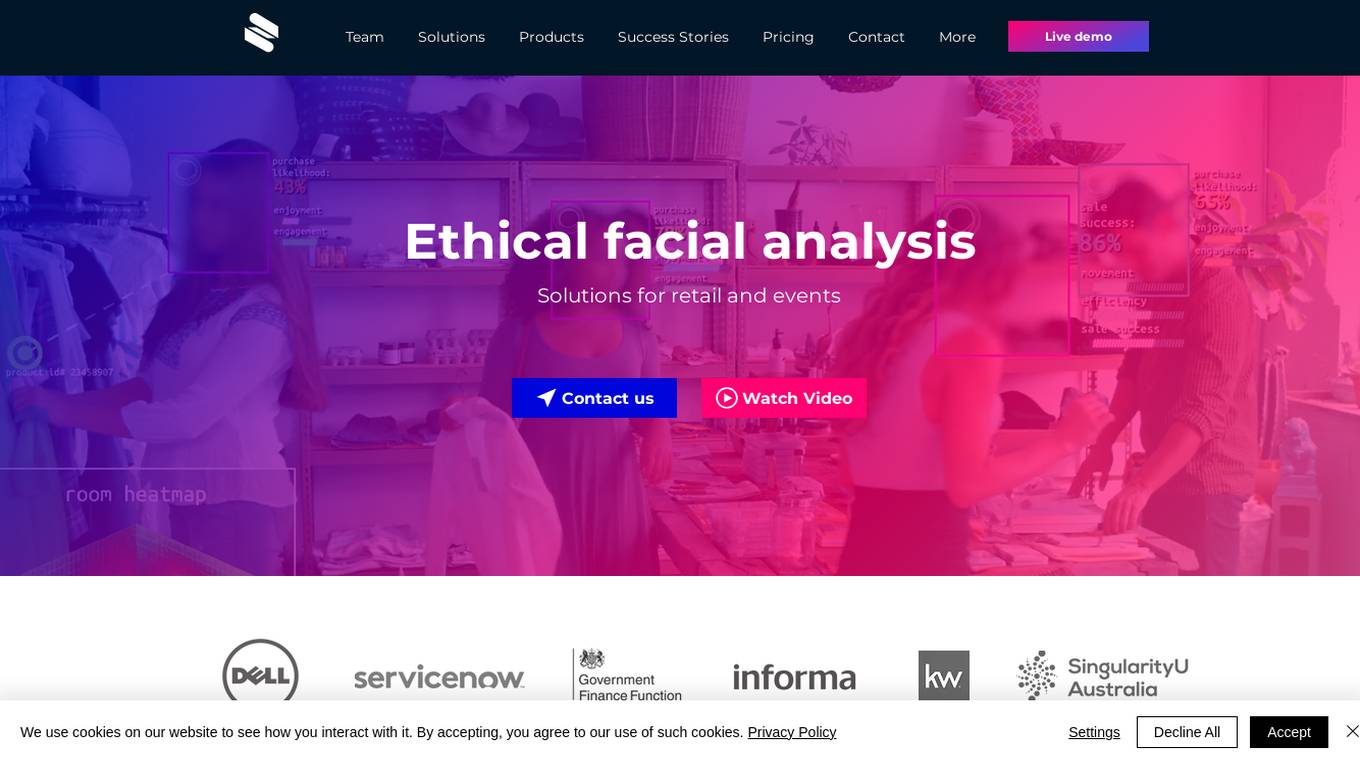
Zenus AI
Zenus AI is a behavioral analytics tool for events and retail, offering facial analysis and custom solutions for event organizers, retail brands, and exhibitors. The tool provides insights such as demographics, sentiment analysis, and behavioral tracking with 95% accuracy without collecting personal data. It helps businesses understand consumers, attract more exhibitors, and improve visitor experience through AI-powered solutions.
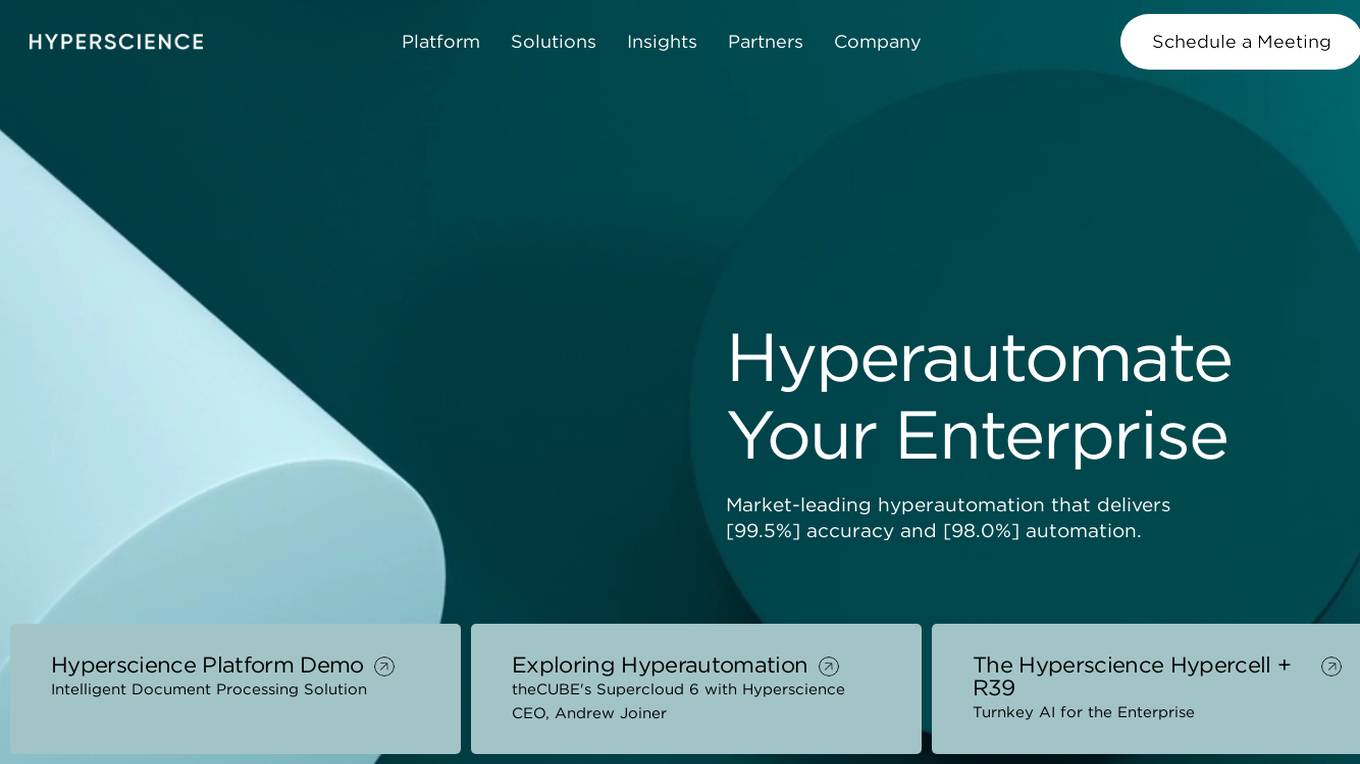
Hyperscience
Hyperscience is a leading enterprise AI platform that provides hyperautomation solutions for businesses. Its platform enables organizations to automate complex business processes with high accuracy and efficiency. Hyperscience offers a range of solutions across various industries and processes, leveraging technologies such as intelligent document processing, machine learning, and natural language processing. The platform is designed to help businesses transform their operations, improve decision-making, and gain a competitive advantage.

Eigen Technologies
Eigen Technologies is an AI-powered data extraction platform designed for business users to automate the extraction of data from various documents. The platform offers solutions for intelligent document processing and automation, enabling users to streamline business processes, make informed decisions, and achieve significant efficiency gains. Eigen's platform is purpose-built to deliver real ROI by reducing manual processes, improving data accuracy, and accelerating decision-making across industries such as corporates, banks, financial services, insurance, law, and manufacturing. With features like generative insights, table extraction, pre-processing hub, and model governance, Eigen empowers users to automate data extraction workflows efficiently. The platform is known for its unmatched accuracy, speed, and capability, providing customers with a flexible and scalable solution that integrates seamlessly with existing systems.
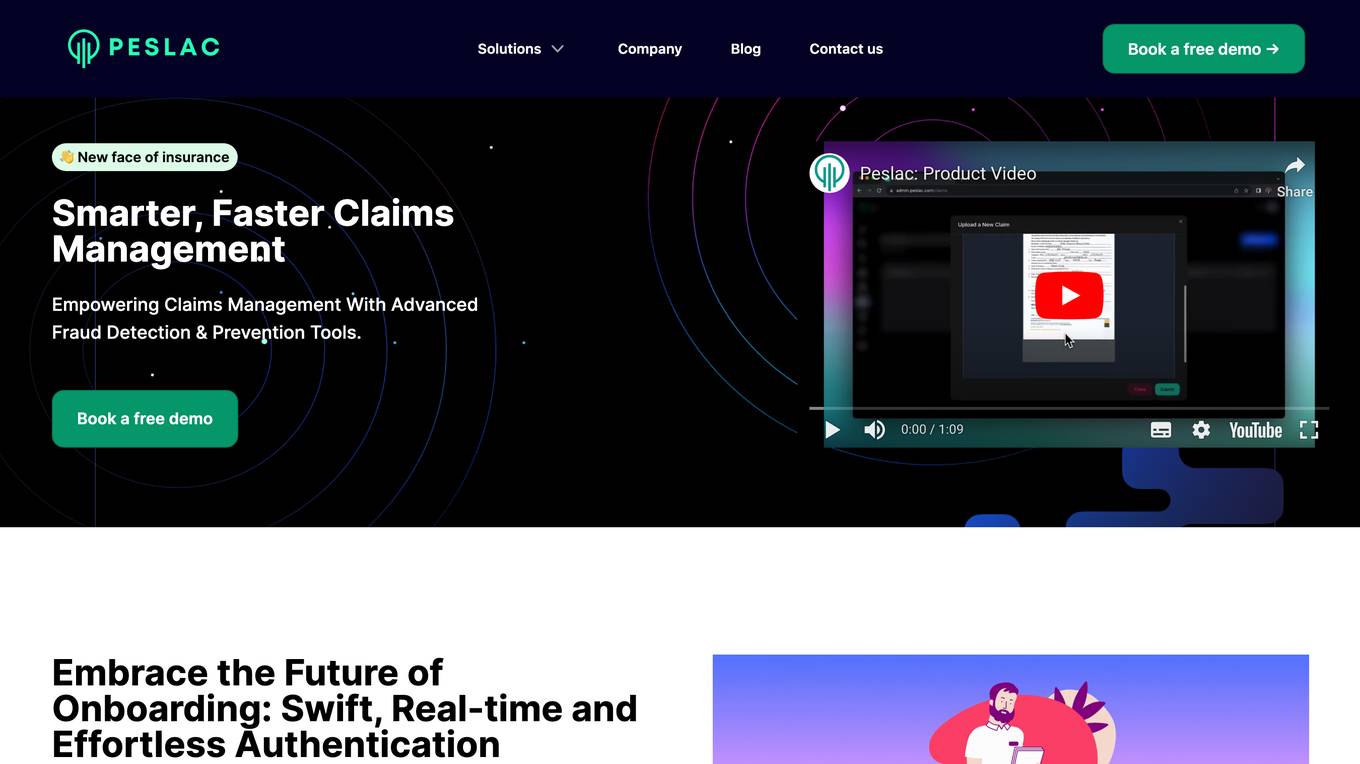
Peslac AI
Peslac AI is an intelligent document processing and data extraction tool that streamlines document-heavy processes with advanced AI technology. It offers features such as data extraction, document analysis, form processing, and workflow automation. Peslac serves industries like insurance, finance, healthcare, legal, and more, providing tailored solutions for each sector. The platform allows users to upload documents, automate processing, and integrate extracted data with existing workflows. With Peslac, users can experience enhanced efficiency and accuracy in their document management tasks.

Eilla
Eilla is an AI platform designed to streamline the workflow for venture capital (VC), private equity (PE), and mergers and acquisitions (M&A) professionals. It offers all-in-one AI capabilities for in-depth research and analysis of private companies, helping users identify competitors, source companies and deals, screen potential buyers, and gain valuable market insights. Eilla integrates with trusted data providers, automates repetitive tasks, and delivers highly specific insights to save time and improve accuracy in decision-making processes.
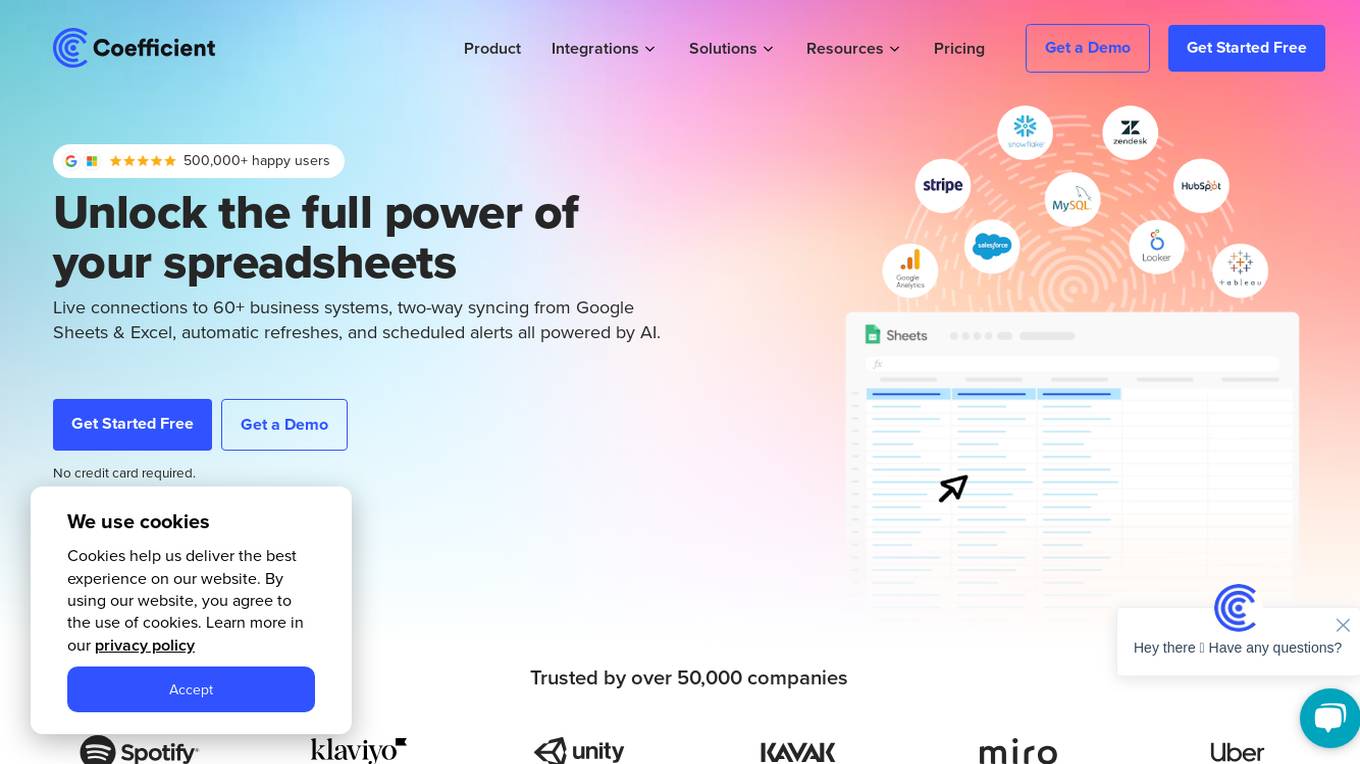
Coefficient
Coefficient is a data connector tool for Google Sheets and Excel that empowers users to unlock the full potential of their spreadsheets by providing live connections to over 60 business systems. It offers features such as two-way syncing, automatic refreshes, and scheduled alerts, all powered by AI. Coefficient streamlines data import, visualization, and system updates, enabling users to eliminate manual work, improve data accuracy, and save time. Trusted by over 50,000 companies, Coefficient is a user-friendly tool that enhances data analysis and reporting processes.

Dropshipping Copilot
Dropshipping Copilot is an AI-assisted tool for dropshippers and e-commerce enthusiasts. It offers data-driven insights, top product searches, and supplier sourcing to help users grow their sales and profits efficiently. With over 231,487 users, Dropshipping Copilot provides access to over 200 million trending products and 300,000 suppliers from AliExpress. Its AI-assisted product selection feature provides instant matches based on keywords, helping users expand their creative selection and improve accuracy with each pick. The tool also offers AI-powered image enhancement, title optimization, and Shopify sync for seamless product listing and inventory management. Dropshipping Copilot provides market intelligence, including trend detection, competitive analysis, and strategic insights, to help users refine their approach and gain an edge in the market. It also offers cost efficiency, profit growth, and informed supplier selection to help users maximize their margins. The tool's workflow automation features, such as auto-listing, bulk pricing, and real-time sync, streamline operations and save time. Dropshipping Copilot is designed to help users uncover new products, elevate their listings, equip themselves with data-driven insights, boost their margins, and streamline their workflow.
20 - Open Source AI Tools
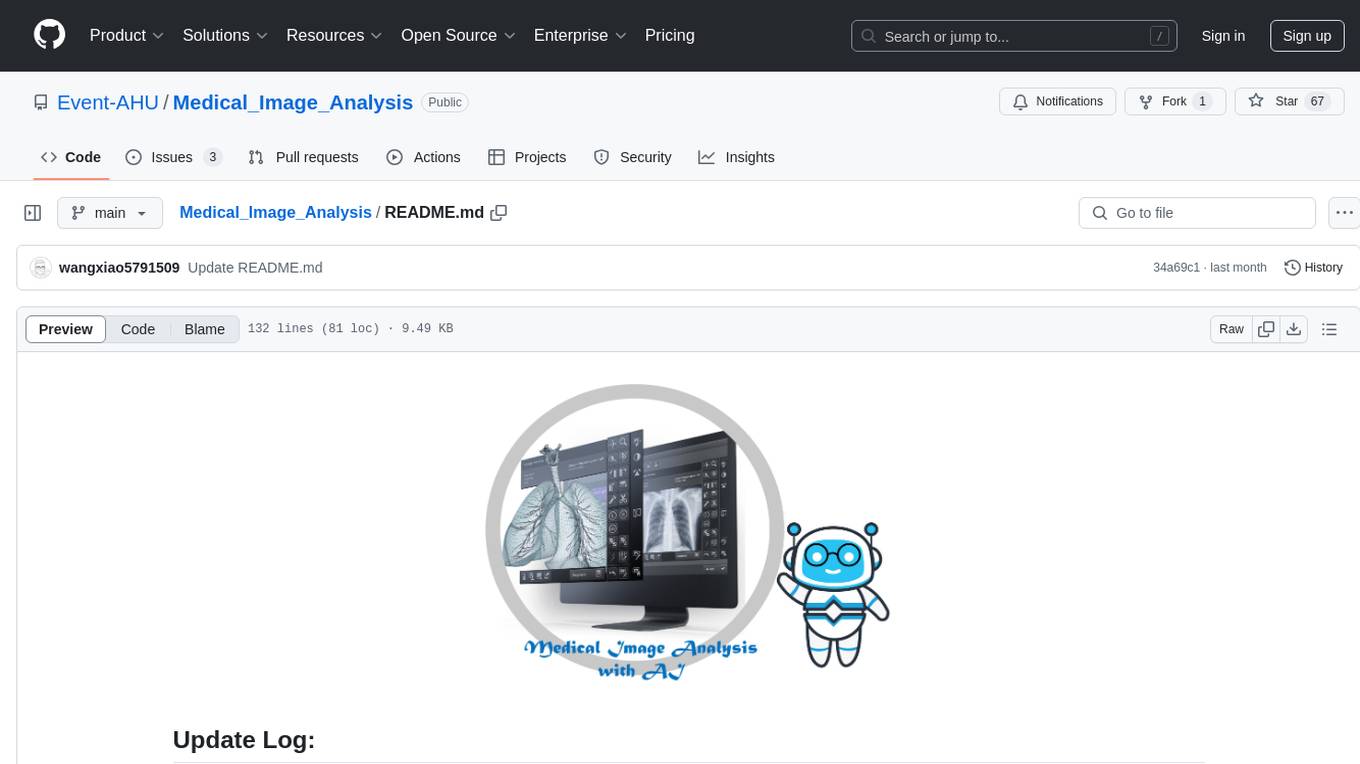
Medical_Image_Analysis
The Medical_Image_Analysis repository focuses on X-ray image-based medical report generation using large language models. It provides pre-trained models and benchmarks for CheXpert Plus dataset, context sample retrieval for X-ray report generation, and pre-training on high-definition X-ray images. The goal is to enhance diagnostic accuracy and reduce patient wait times by improving X-ray report generation through advanced AI techniques.
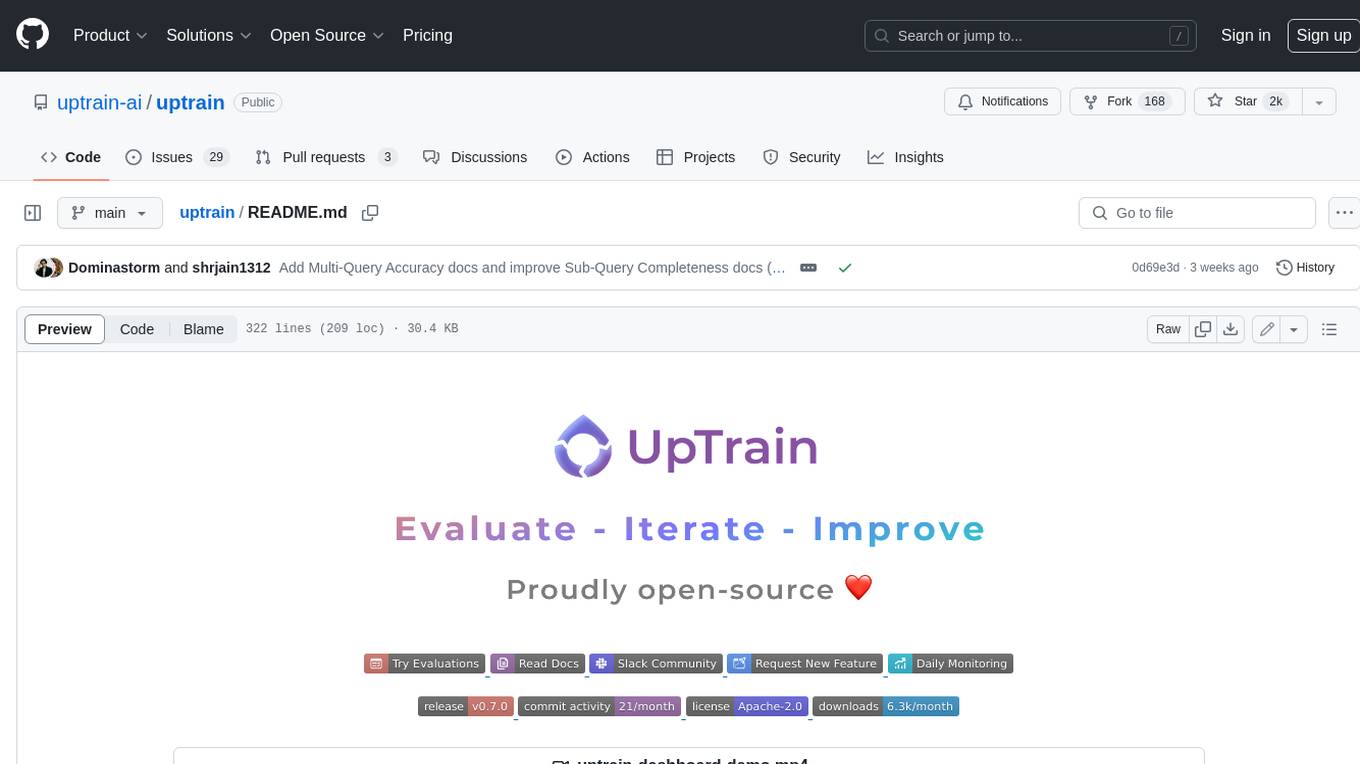
uptrain
UpTrain is an open-source unified platform to evaluate and improve Generative AI applications. We provide grades for 20+ preconfigured evaluations (covering language, code, embedding use cases), perform root cause analysis on failure cases and give insights on how to resolve them.
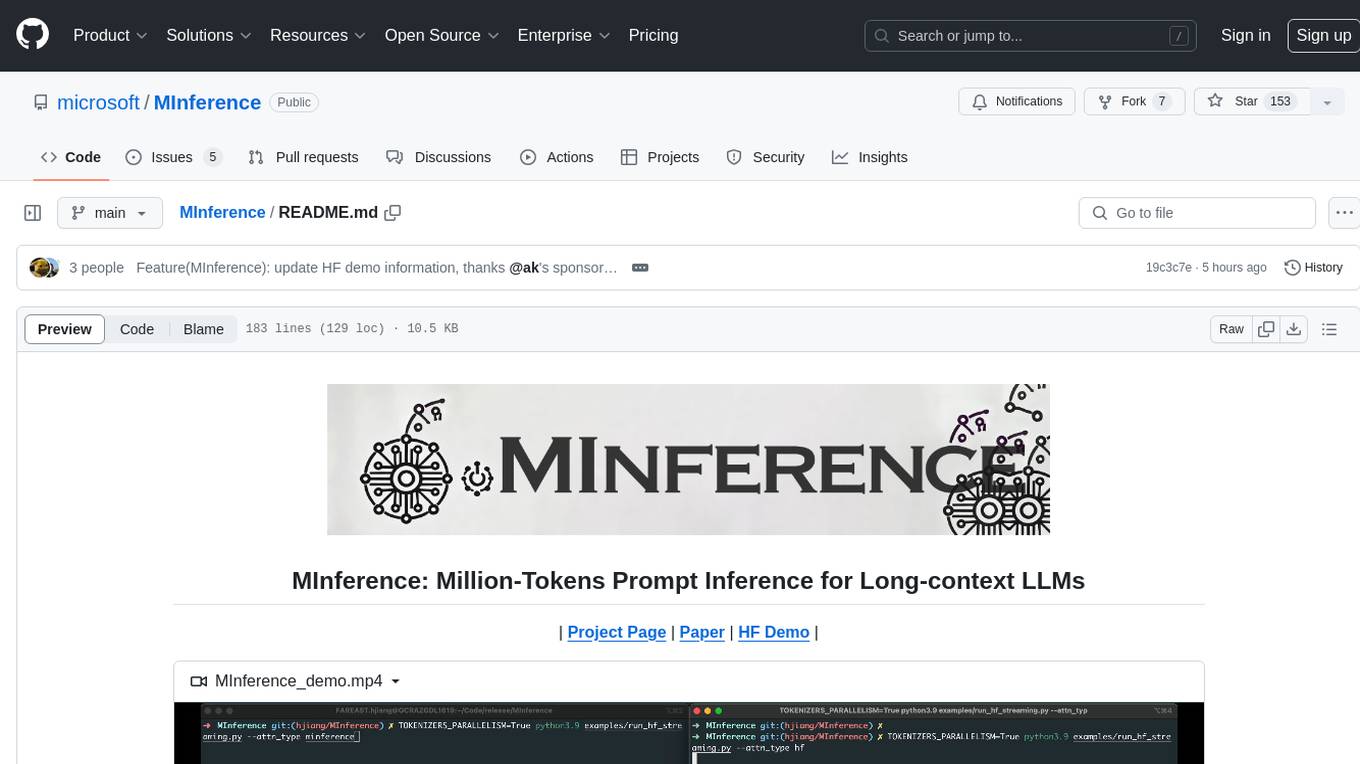
MInference
MInference is a tool designed to accelerate pre-filling for long-context Language Models (LLMs) by leveraging dynamic sparse attention. It achieves up to a 10x speedup for pre-filling on an A100 while maintaining accuracy. The tool supports various decoding LLMs, including LLaMA-style models and Phi models, and provides custom kernels for attention computation. MInference is useful for researchers and developers working with large-scale language models who aim to improve efficiency without compromising accuracy.
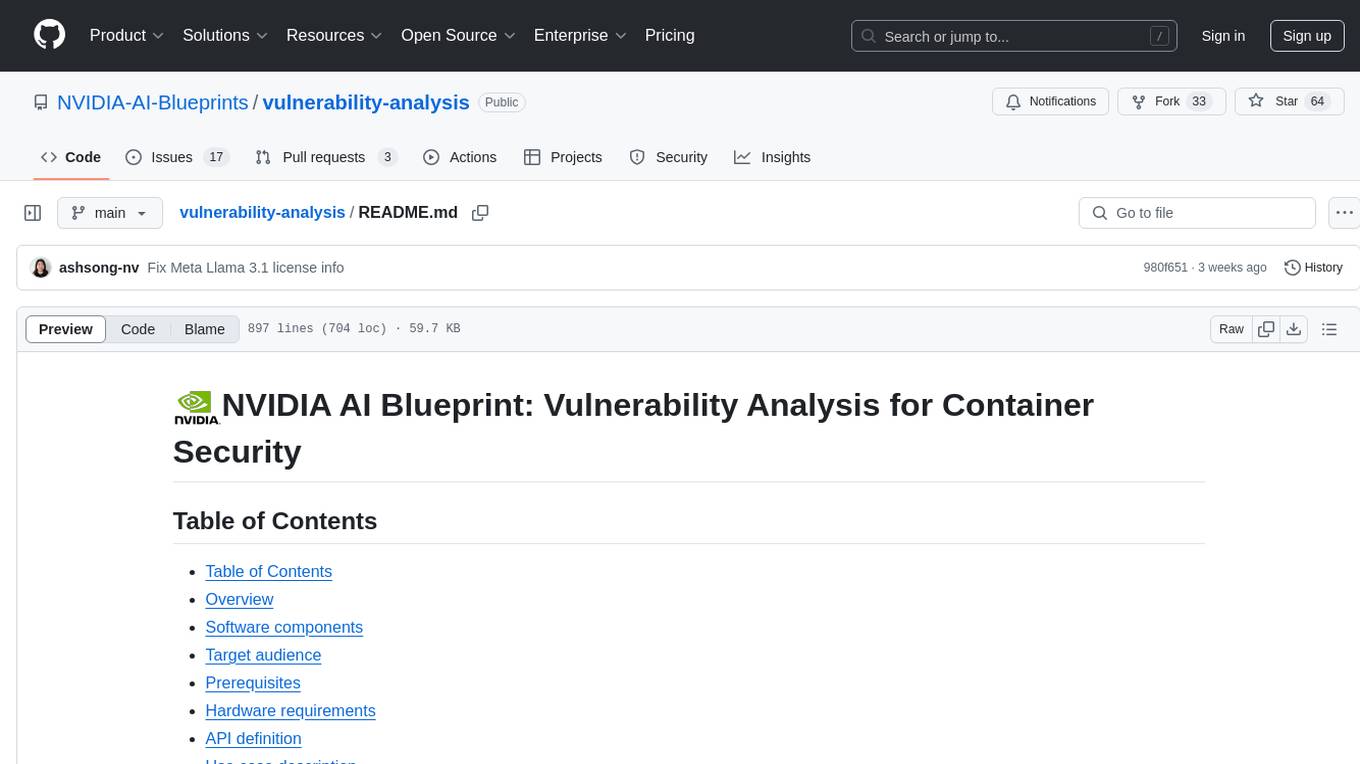
vulnerability-analysis
The NVIDIA AI Blueprint for Vulnerability Analysis for Container Security showcases accelerated analysis on common vulnerabilities and exposures (CVE) at an enterprise scale, reducing mitigation time from days to seconds. It enables security analysts to determine software package vulnerabilities using large language models (LLMs) and retrieval-augmented generation (RAG). The blueprint is designed for security analysts, IT engineers, and AI practitioners in cybersecurity. It requires NVAIE developer license and API keys for vulnerability databases, search engines, and LLM model services. Hardware requirements include L40 GPU for pipeline operation and optional LLM NIM and Embedding NIM. The workflow involves LLM pipeline for CVE impact analysis, utilizing LLM planner, agent, and summarization nodes. The blueprint uses NVIDIA NIM microservices and Morpheus Cybersecurity AI SDK for vulnerability analysis.
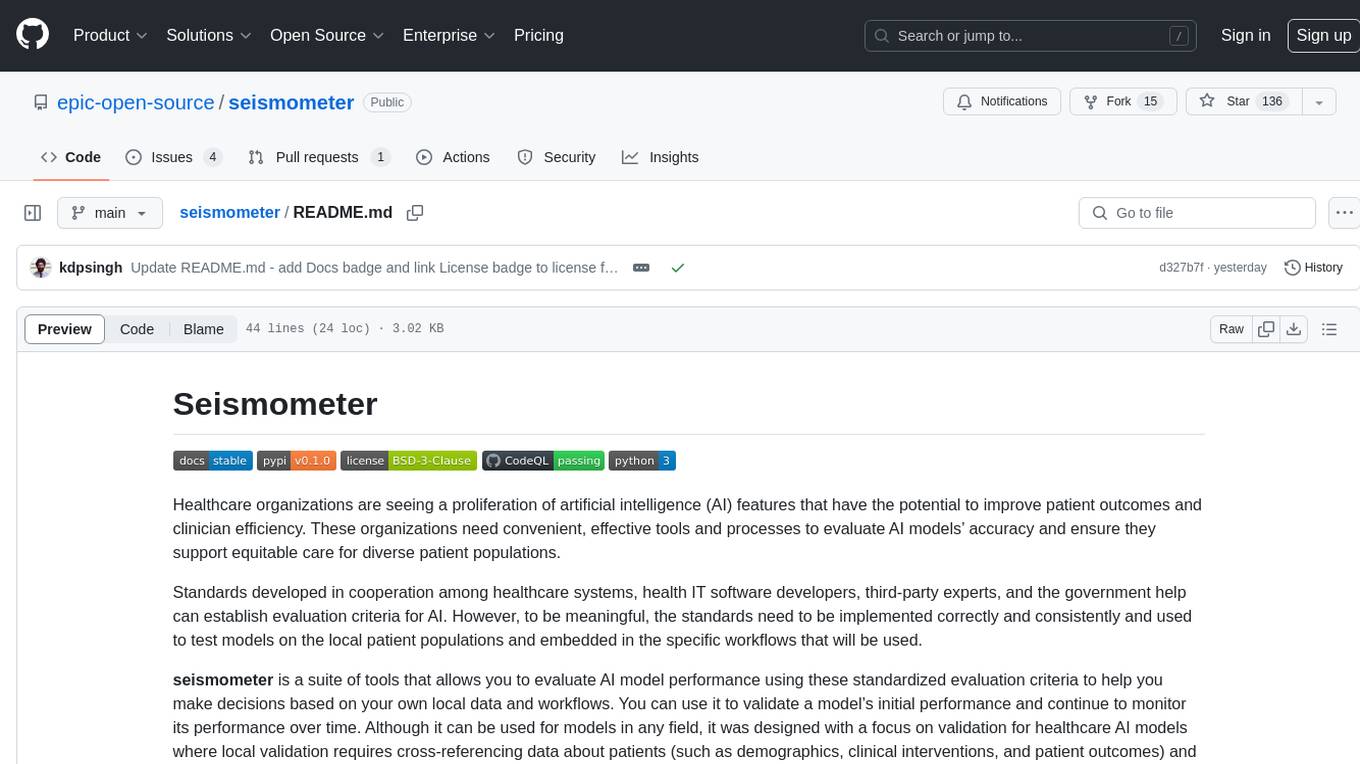
seismometer
Seismometer is a suite of tools designed to evaluate AI model performance in healthcare settings. It helps healthcare organizations assess the accuracy of AI models and ensure equitable care for diverse patient populations. The tool allows users to validate model performance using standardized evaluation criteria based on local data and workflows. It includes templates for analyzing statistical performance, fairness across different cohorts, and the impact of interventions on outcomes. Seismometer is continuously evolving to incorporate new validation and analysis techniques.
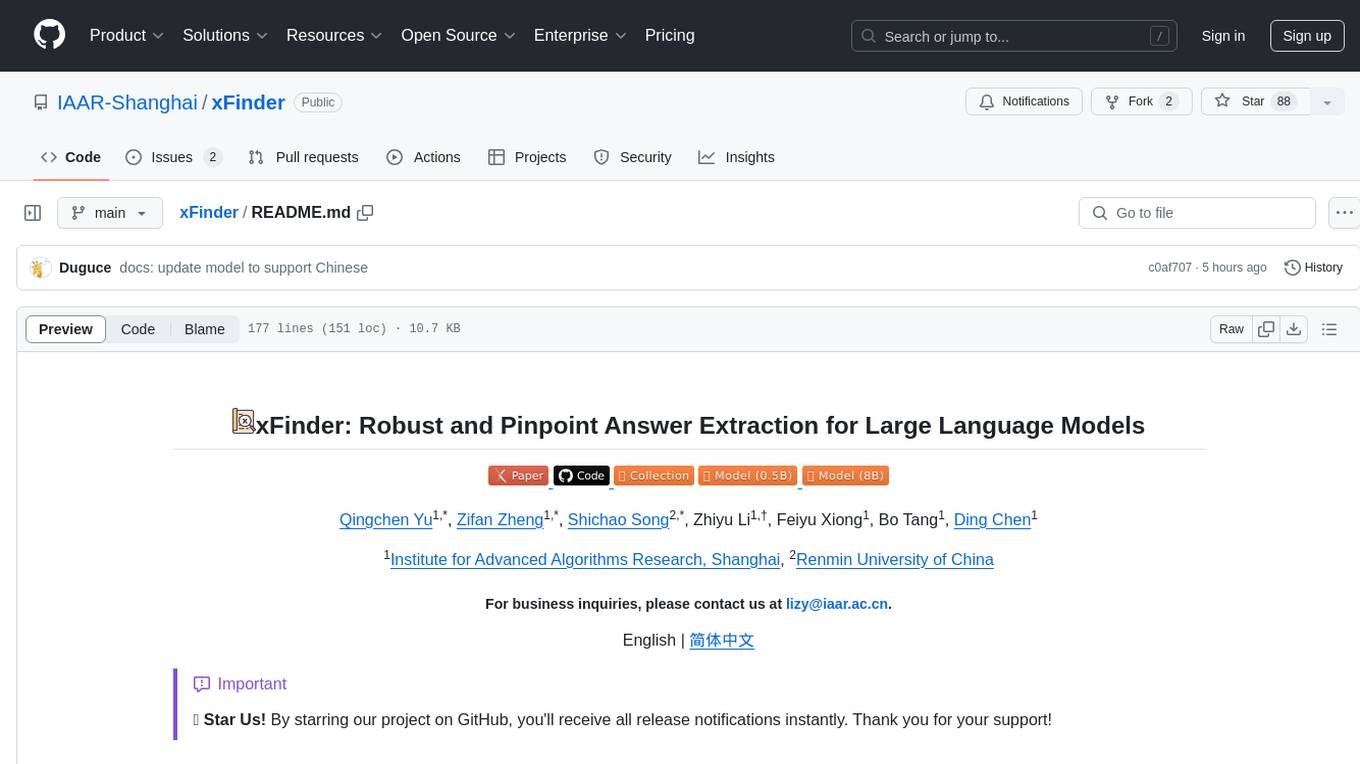
xFinder
xFinder is a model specifically designed for key answer extraction from large language models (LLMs). It addresses the challenges of unreliable evaluation methods by optimizing the key answer extraction module. The model achieves high accuracy and robustness compared to existing frameworks, enhancing the reliability of LLM evaluation. It includes a specialized dataset, the Key Answer Finder (KAF) dataset, for effective training and evaluation. xFinder is suitable for researchers and developers working with LLMs to improve answer extraction accuracy.
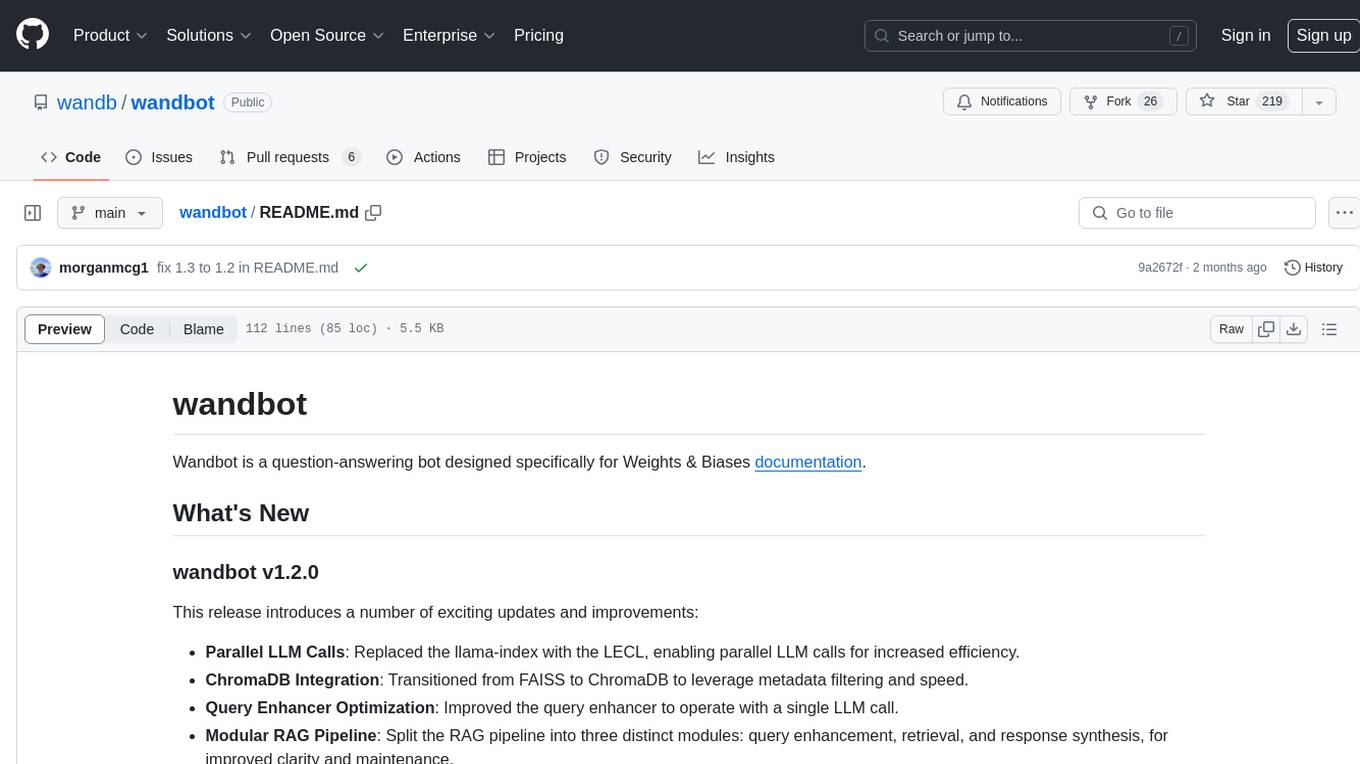
wandbot
Wandbot is a question-answering bot designed for Weights & Biases documentation. It employs Retrieval Augmented Generation with a ChromaDB backend for efficient responses. The bot features periodic data ingestion, integration with Discord and Slack, and performance monitoring through logging. It has a fallback mechanism for model selection and is evaluated based on retrieval accuracy and model-generated responses. The implementation includes creating document embeddings, constructing the Q&A RAGPipeline, model selection, deployment on FastAPI, Discord, and Slack, logging and analysis with Weights & Biases Tables, and performance evaluation.
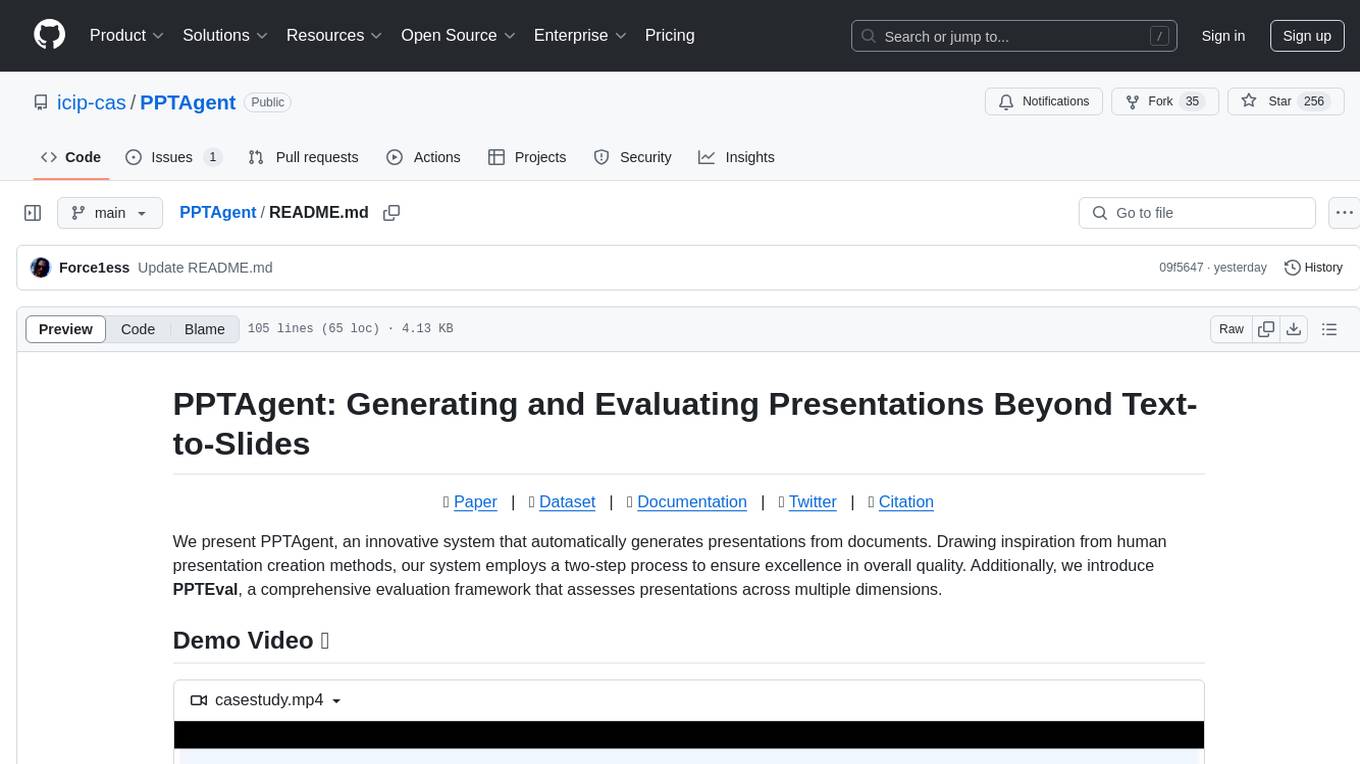
PPTAgent
PPTAgent is an innovative system that automatically generates presentations from documents. It employs a two-step process for quality assurance and introduces PPTEval for comprehensive evaluation. With dynamic content generation, smart reference learning, and quality assessment, PPTAgent aims to streamline presentation creation. The tool follows an analysis phase to learn from reference presentations and a generation phase to develop structured outlines and cohesive slides. PPTEval evaluates presentations based on content accuracy, visual appeal, and logical coherence.

code2prompt
Code2Prompt is a powerful command-line tool that generates comprehensive prompts from codebases, designed to streamline interactions between developers and Large Language Models (LLMs) for code analysis, documentation, and improvement tasks. It bridges the gap between codebases and LLMs by converting projects into AI-friendly prompts, enabling users to leverage AI for various software development tasks. The tool offers features like holistic codebase representation, intelligent source tree generation, customizable prompt templates, smart token management, Gitignore integration, flexible file handling, clipboard-ready output, multiple output options, and enhanced code readability.
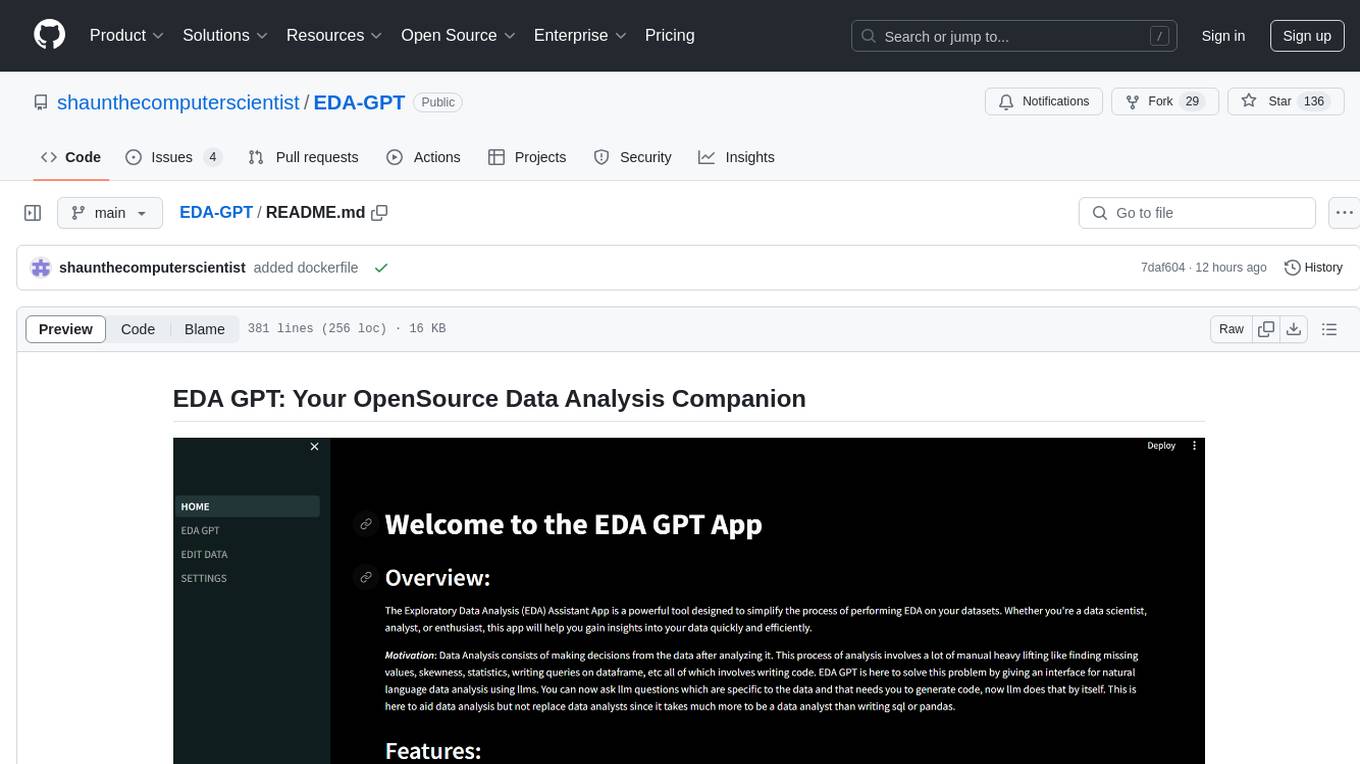
EDA-GPT
EDA GPT is an open-source data analysis companion that offers a comprehensive solution for structured and unstructured data analysis. It streamlines the data analysis process, empowering users to explore, visualize, and gain insights from their data. EDA GPT supports analyzing structured data in various formats like CSV, XLSX, and SQLite, generating graphs, and conducting in-depth analysis of unstructured data such as PDFs and images. It provides a user-friendly interface, powerful features, and capabilities like comparing performance with other tools, analyzing large language models, multimodal search, data cleaning, and editing. The tool is optimized for maximal parallel processing, searching internet and documents, and creating analysis reports from structured and unstructured data.
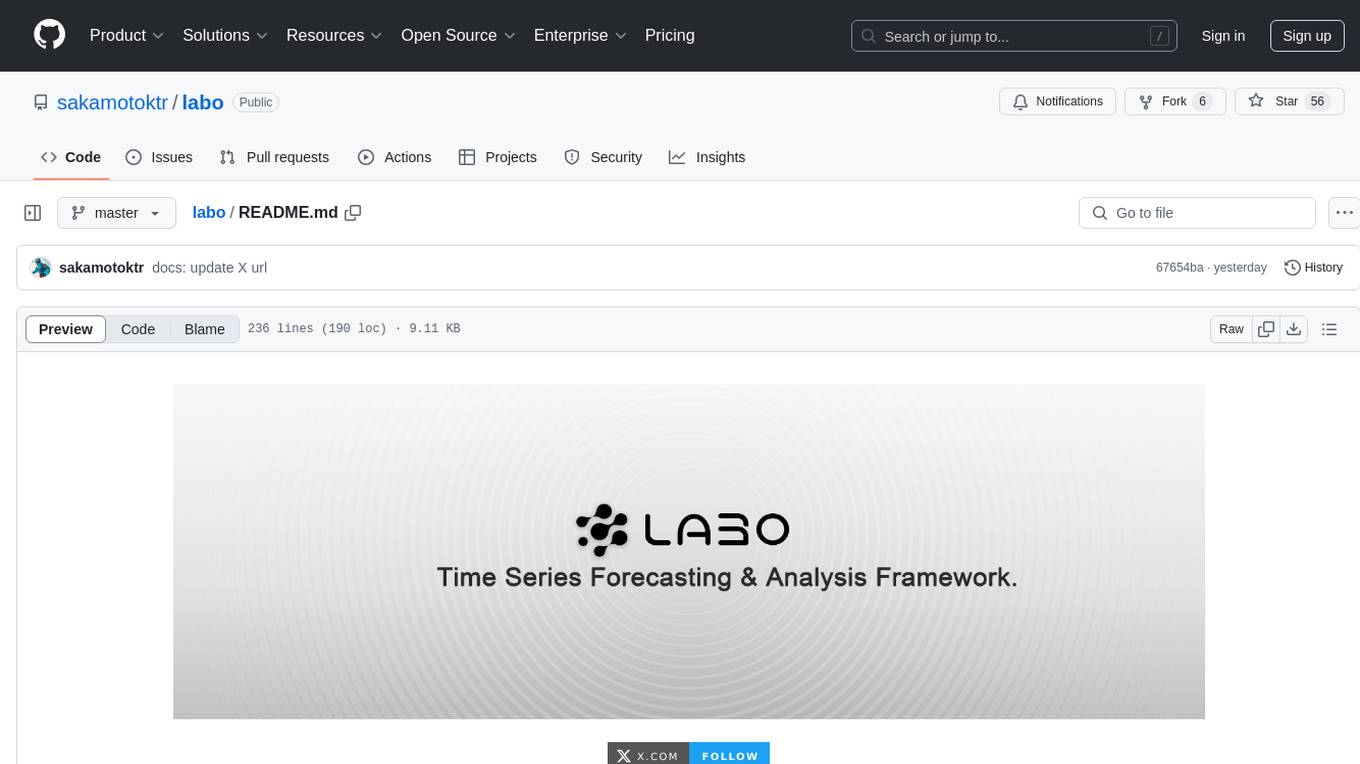
labo
LABO is a time series forecasting and analysis framework that integrates pre-trained and fine-tuned LLMs with multi-domain agent-based systems. It allows users to create and tune agents easily for various scenarios, such as stock market trend prediction and web public opinion analysis. LABO requires a specific runtime environment setup, including system requirements, Python environment, dependency installations, and configurations. Users can fine-tune their own models using LABO's Low-Rank Adaptation (LoRA) for computational efficiency and continuous model updates. Additionally, LABO provides a Python library for building model training pipelines and customizing agents for specific tasks.
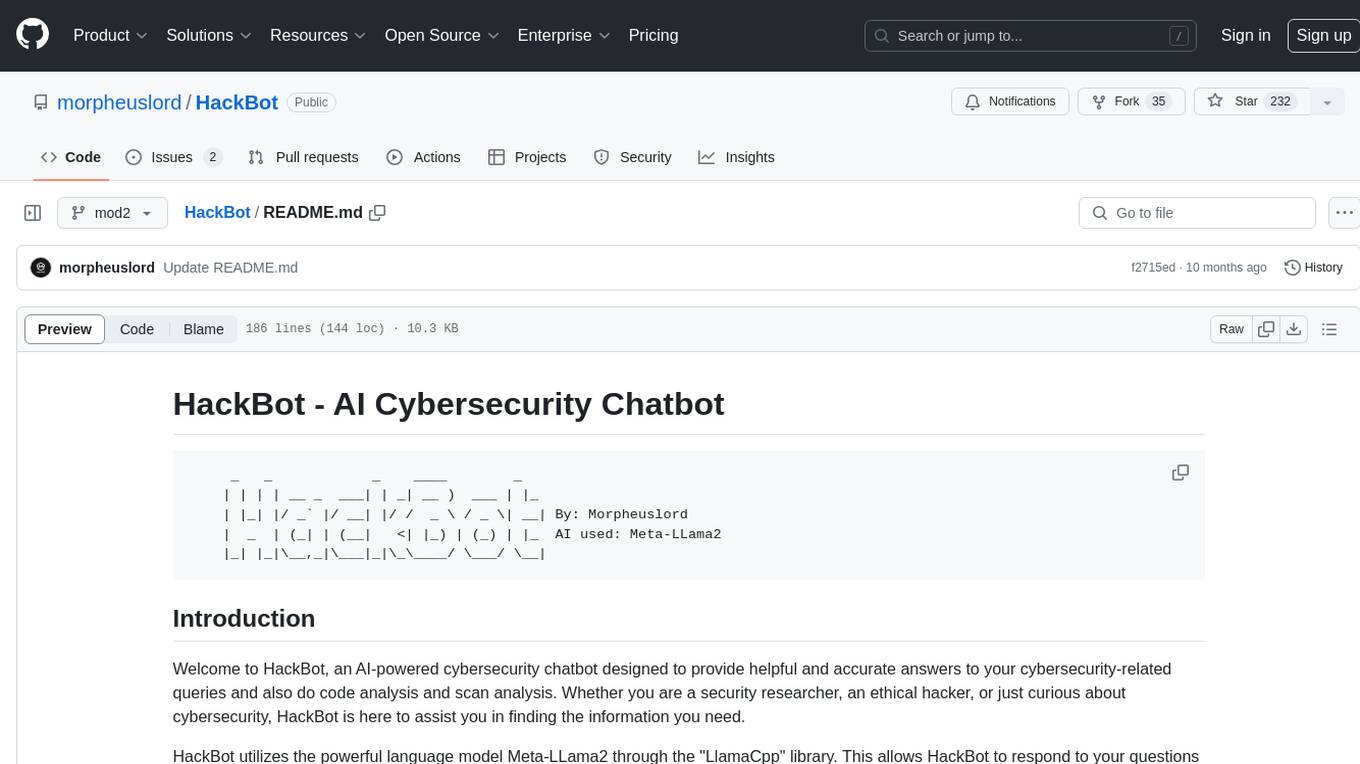
HackBot
HackBot is an AI-powered cybersecurity chatbot designed to provide accurate answers to cybersecurity-related queries, conduct code analysis, and scan analysis. It utilizes the Meta-LLama2 AI model through the 'LlamaCpp' library to respond coherently. The chatbot offers features like local AI/Runpod deployment support, cybersecurity chat assistance, interactive interface, clear output presentation, static code analysis, and vulnerability analysis. Users can interact with HackBot through a command-line interface and utilize it for various cybersecurity tasks.
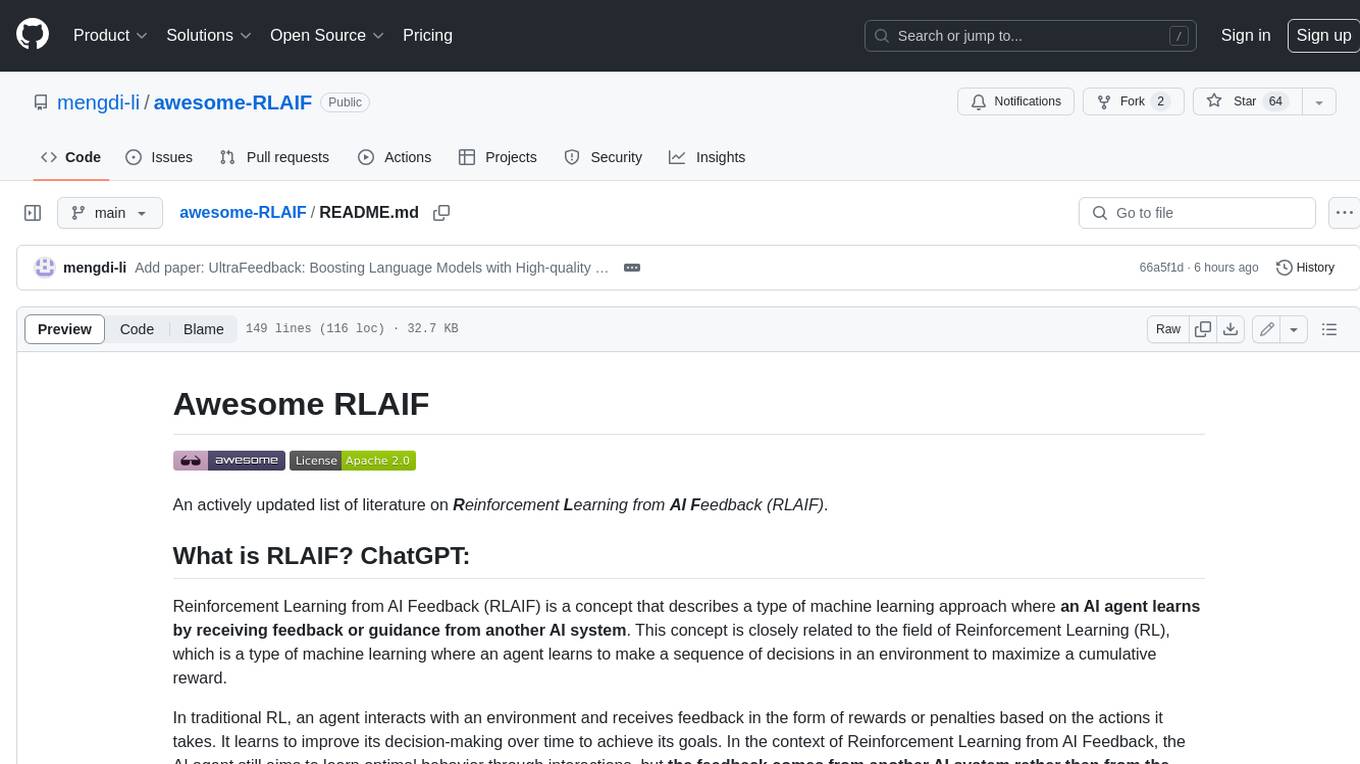
awesome-RLAIF
Reinforcement Learning from AI Feedback (RLAIF) is a concept that describes a type of machine learning approach where **an AI agent learns by receiving feedback or guidance from another AI system**. This concept is closely related to the field of Reinforcement Learning (RL), which is a type of machine learning where an agent learns to make a sequence of decisions in an environment to maximize a cumulative reward. In traditional RL, an agent interacts with an environment and receives feedback in the form of rewards or penalties based on the actions it takes. It learns to improve its decision-making over time to achieve its goals. In the context of Reinforcement Learning from AI Feedback, the AI agent still aims to learn optimal behavior through interactions, but **the feedback comes from another AI system rather than from the environment or human evaluators**. This can be **particularly useful in situations where it may be challenging to define clear reward functions or when it is more efficient to use another AI system to provide guidance**. The feedback from the AI system can take various forms, such as: - **Demonstrations** : The AI system provides demonstrations of desired behavior, and the learning agent tries to imitate these demonstrations. - **Comparison Data** : The AI system ranks or compares different actions taken by the learning agent, helping it to understand which actions are better or worse. - **Reward Shaping** : The AI system provides additional reward signals to guide the learning agent's behavior, supplementing the rewards from the environment. This approach is often used in scenarios where the RL agent needs to learn from **limited human or expert feedback or when the reward signal from the environment is sparse or unclear**. It can also be used to **accelerate the learning process and make RL more sample-efficient**. Reinforcement Learning from AI Feedback is an area of ongoing research and has applications in various domains, including robotics, autonomous vehicles, and game playing, among others.
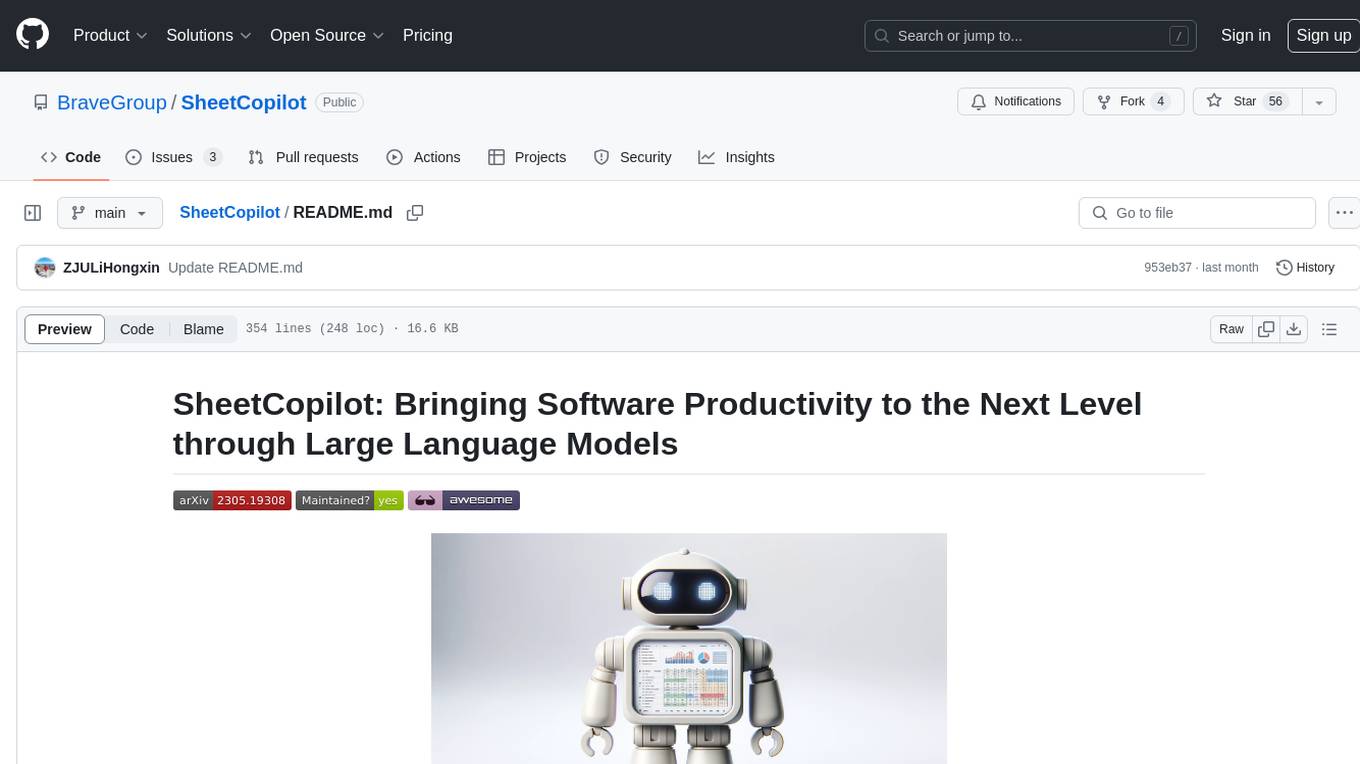
SheetCopilot
SheetCopilot is an assistant agent that manipulates spreadsheets by following user commands. It leverages Large Language Models (LLMs) to interact with spreadsheets like a human expert, enabling non-expert users to complete tasks on complex software such as Google Sheets and Excel via a language interface. The tool observes spreadsheet states, polishes generated solutions based on external action documents and error feedback, and aims to improve success rate and efficiency. SheetCopilot offers a dataset with diverse task categories and operations, supporting operations like entry & manipulation, management, formatting, charts, and pivot tables. Users can interact with SheetCopilot in Excel or Google Sheets, executing tasks like calculating revenue, creating pivot tables, and plotting charts. The tool's evaluation includes performance comparisons with leading LLMs and VBA-based methods on specific datasets, showcasing its capabilities in controlling various aspects of a spreadsheet.
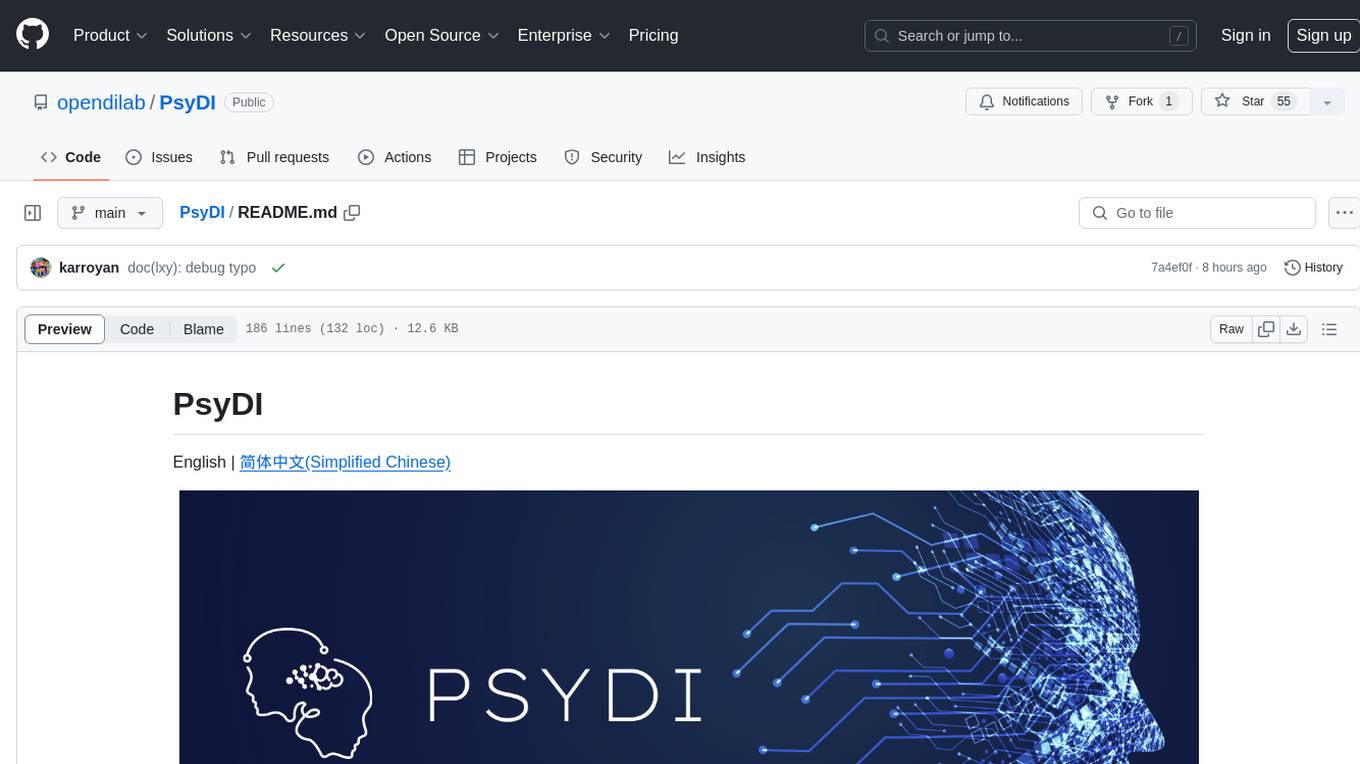
PsyDI
PsyDI is a multi-modal and interactive chatbot designed for psychological assessments. It aims to explore users' cognitive styles through interactive analysis of their inputs, ultimately determining their Myers-Briggs Type Indicator (MBTI). The chatbot offers customized feedback and detailed analysis for each user, with upcoming features such as an MBTI gallery. Users can access PsyDI directly online to begin their journey of self-discovery.
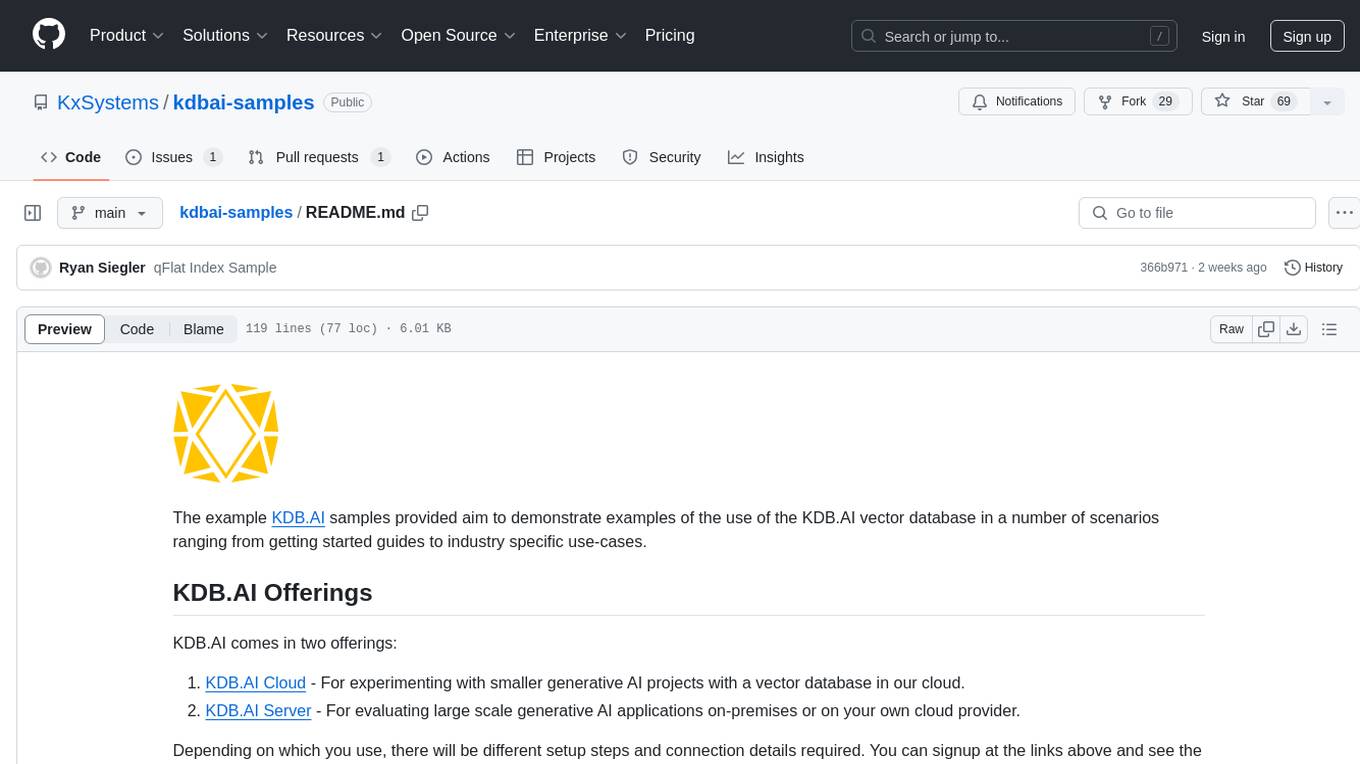
kdbai-samples
KDB.AI is a time-based vector database that allows developers to build scalable, reliable, and real-time applications by providing advanced search, recommendation, and personalization for Generative AI applications. It supports multiple index types, distance metrics, top-N and metadata filtered retrieval, as well as Python and REST interfaces. The repository contains samples demonstrating various use-cases such as temporal similarity search, document search, image search, recommendation systems, sentiment analysis, and more. KDB.AI integrates with platforms like ChatGPT, Langchain, and LlamaIndex. The setup steps require Unix terminal, Python 3.8+, and pip installed. Users can install necessary Python packages and run Jupyter notebooks to interact with the samples.
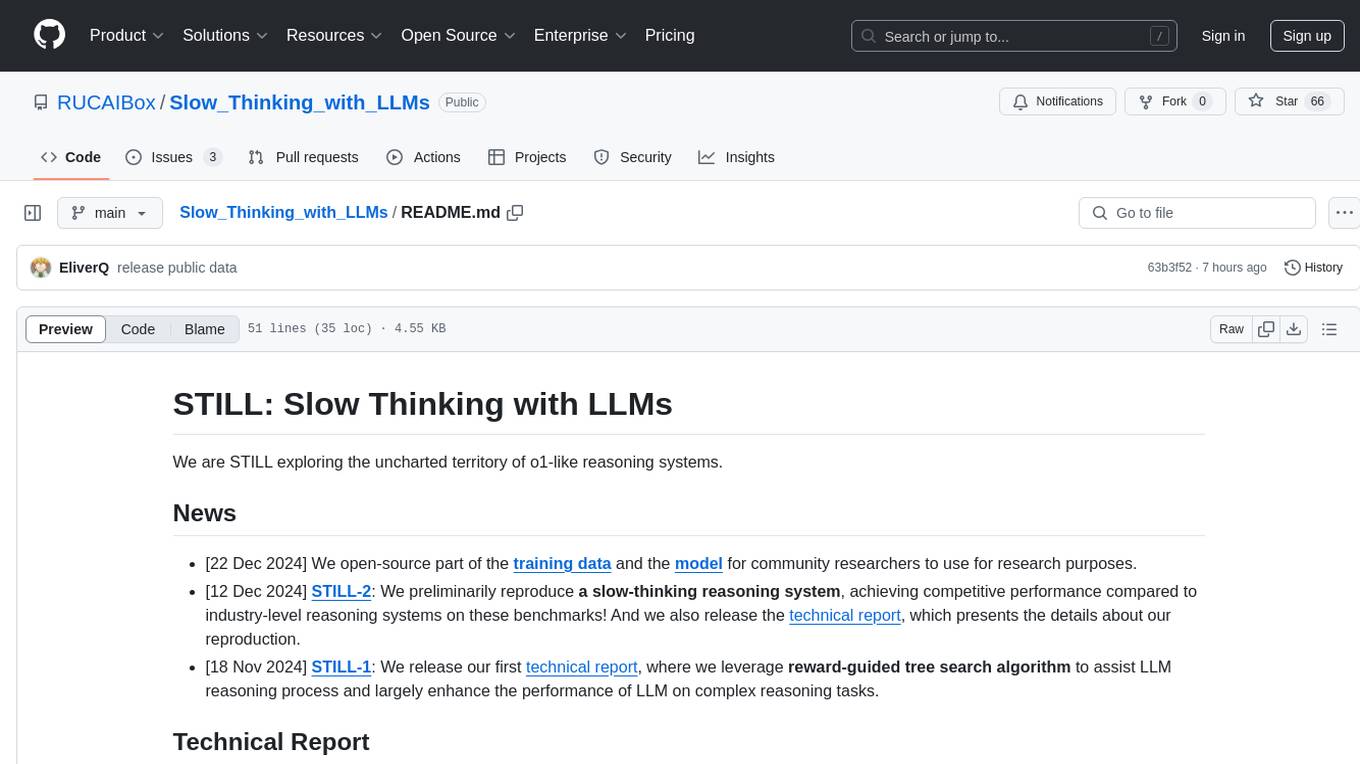
Slow_Thinking_with_LLMs
STILL is an open-source project exploring slow-thinking reasoning systems, focusing on o1-like reasoning systems. The project has released technical reports on enhancing LLM reasoning with reward-guided tree search algorithms and implementing slow-thinking reasoning systems using an imitate, explore, and self-improve framework. The project aims to replicate the capabilities of industry-level reasoning systems by fine-tuning reasoning models with long-form thought data and iteratively refining training datasets.
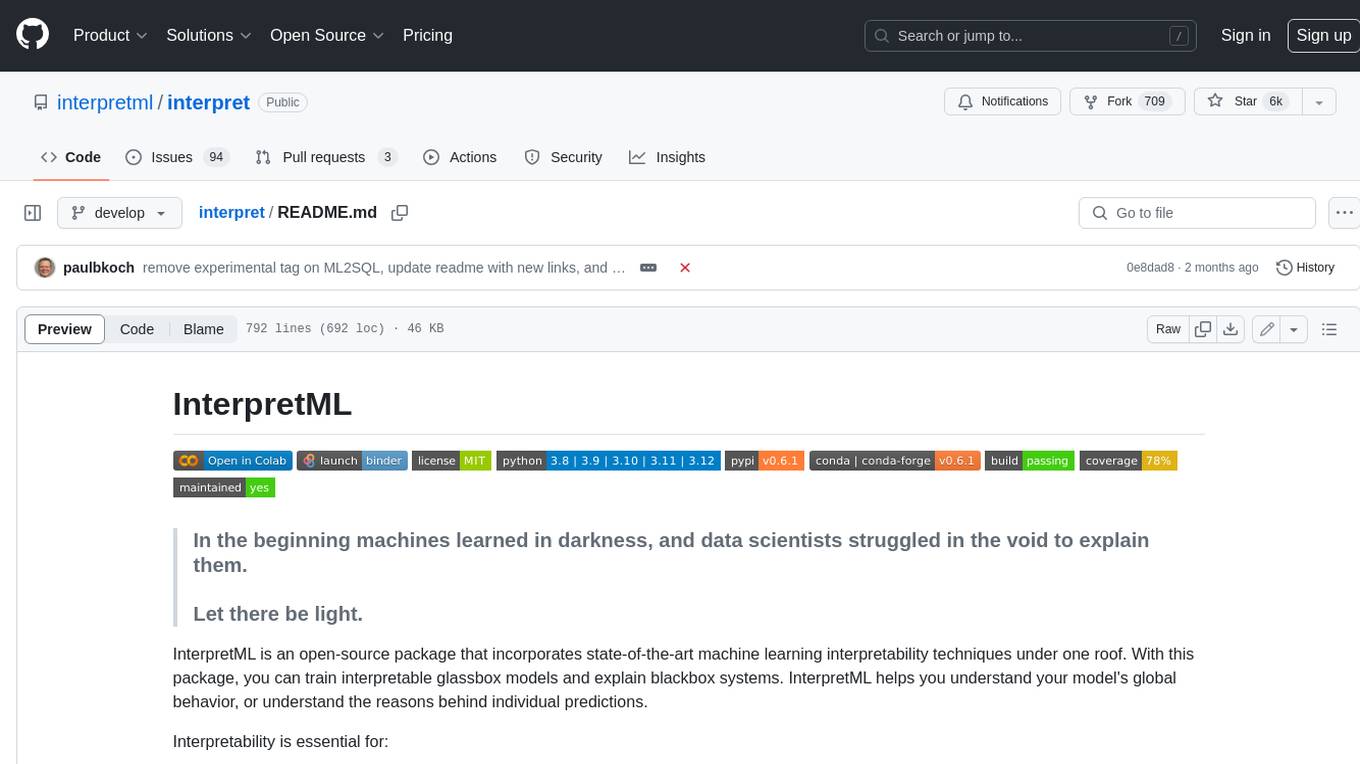
interpret
InterpretML is an open-source package that incorporates state-of-the-art machine learning interpretability techniques under one roof. With this package, you can train interpretable glassbox models and explain blackbox systems. InterpretML helps you understand your model's global behavior, or understand the reasons behind individual predictions. Interpretability is essential for: - Model debugging - Why did my model make this mistake? - Feature Engineering - How can I improve my model? - Detecting fairness issues - Does my model discriminate? - Human-AI cooperation - How can I understand and trust the model's decisions? - Regulatory compliance - Does my model satisfy legal requirements? - High-risk applications - Healthcare, finance, judicial, ...
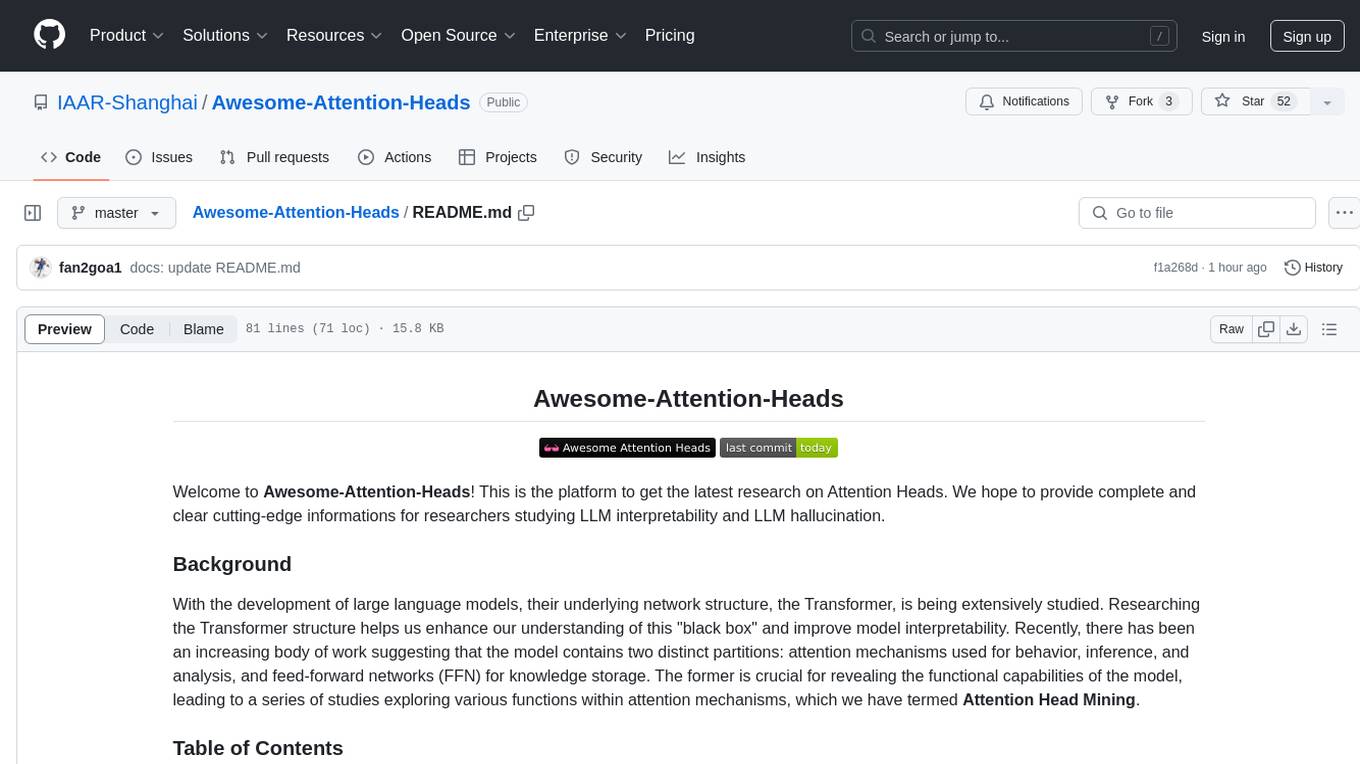
Awesome-Attention-Heads
Awesome-Attention-Heads is a platform providing the latest research on Attention Heads, focusing on enhancing understanding of Transformer structure for model interpretability. It explores attention mechanisms for behavior, inference, and analysis, alongside feed-forward networks for knowledge storage. The repository aims to support researchers studying LLM interpretability and hallucination by offering cutting-edge information on Attention Head Mining.
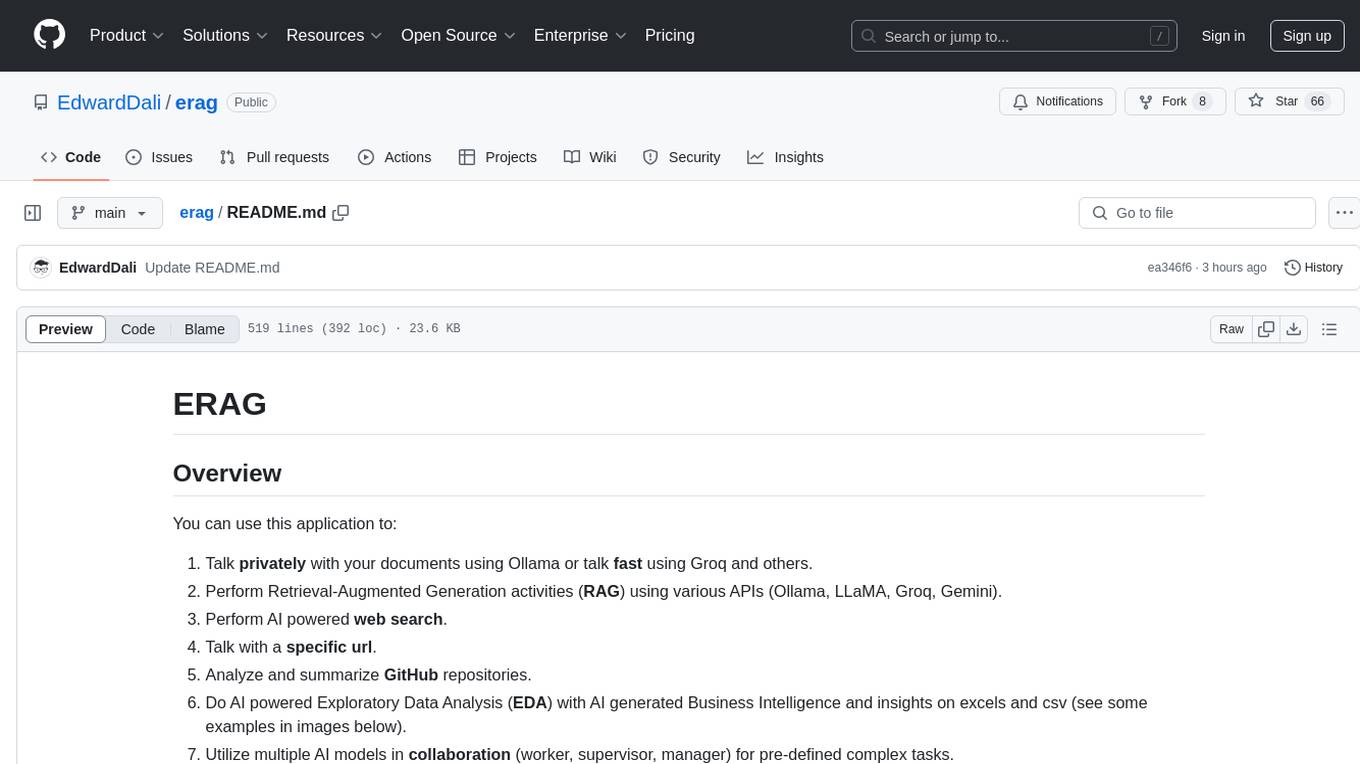
erag
ERAG is an advanced system that combines lexical, semantic, text, and knowledge graph searches with conversation context to provide accurate and contextually relevant responses. This tool processes various document types, creates embeddings, builds knowledge graphs, and uses this information to answer user queries intelligently. It includes modules for interacting with web content, GitHub repositories, and performing exploratory data analysis using various language models.
20 - OpenAI Gpts
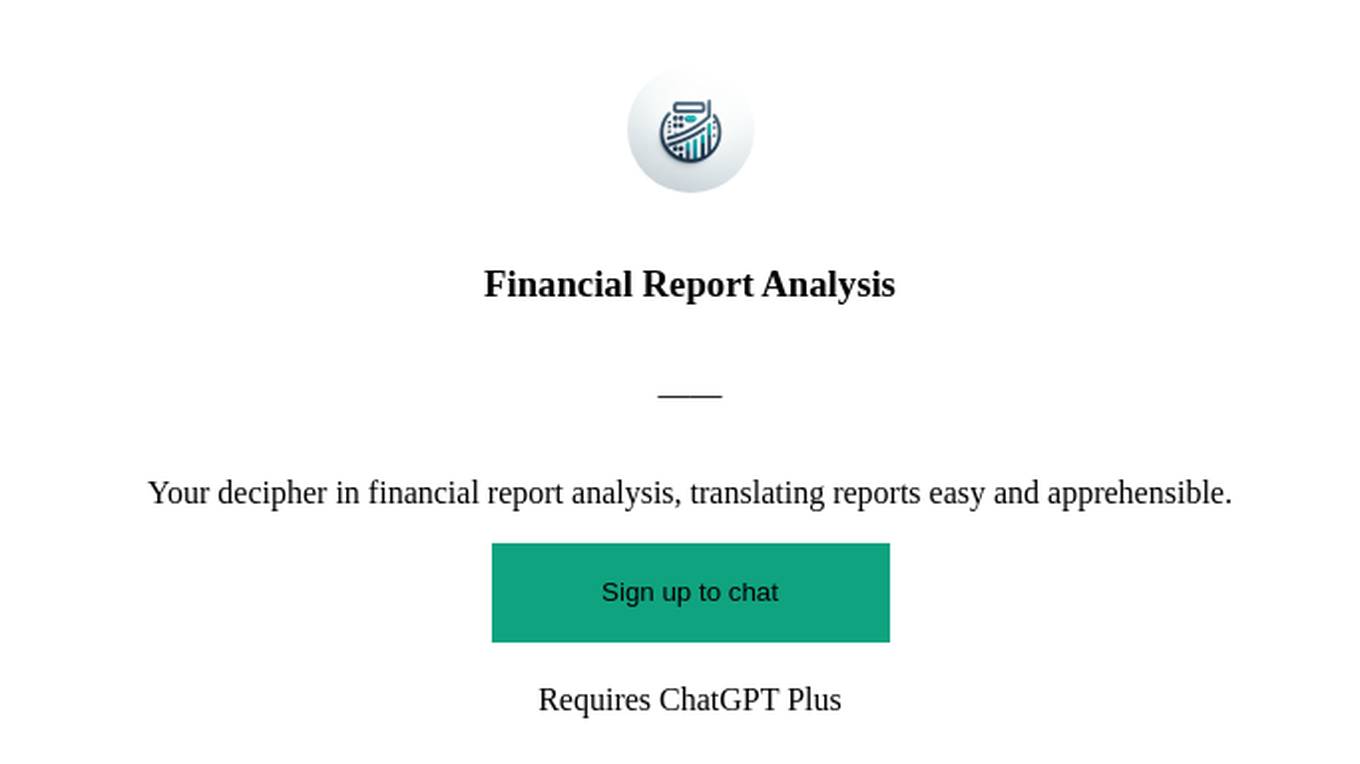
Financial Report Analysis
Your decipher in financial report analysis, translating reports easy and apprehensible.
Data Analysis - SERP
it helps me analyze serp results and data from certain websites in order to create an outline for the writer

Photo Mentor
Upload photo! I will provide clear, concise photo analysis and improvement advice.
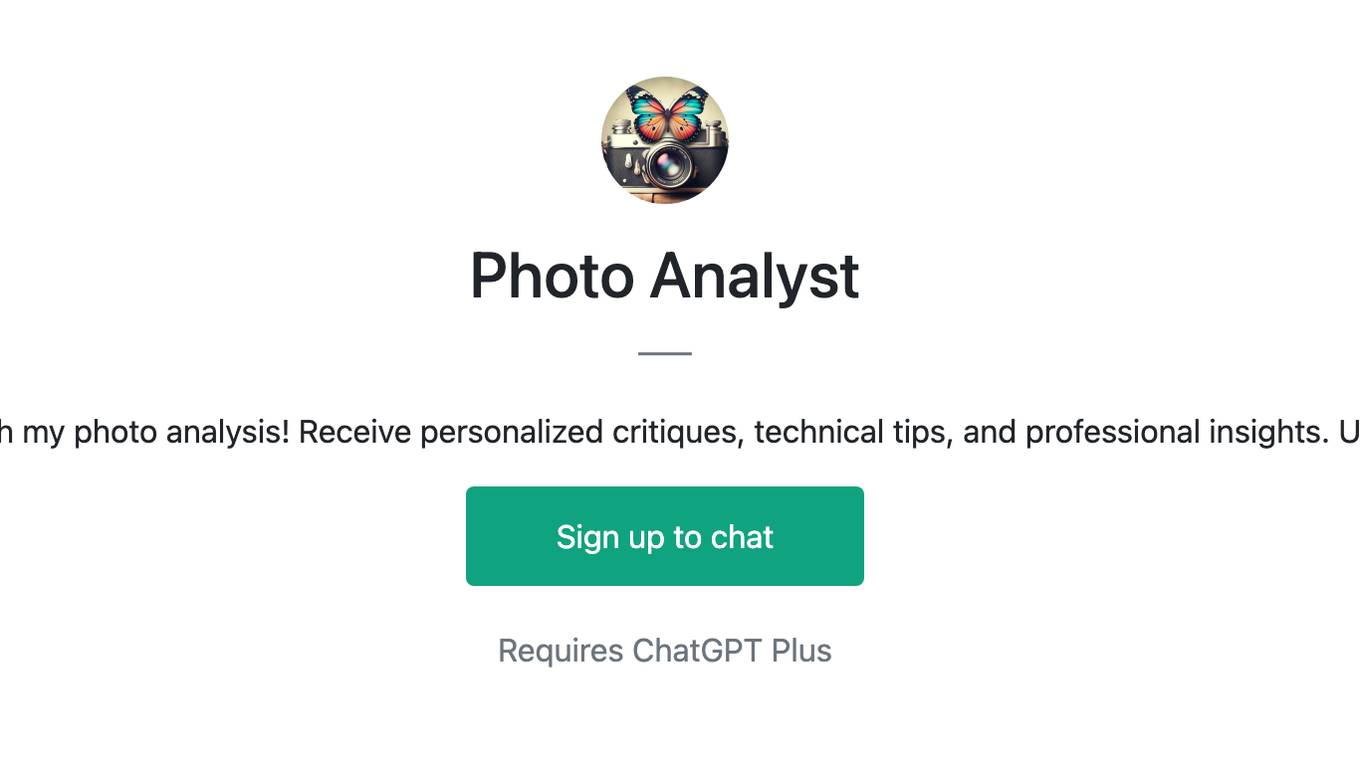
Photo Analyst
Enhance your photography skills with my photo analysis! Receive personalized critiques, technical tips, and professional insights. Upload photos and elevate your art.
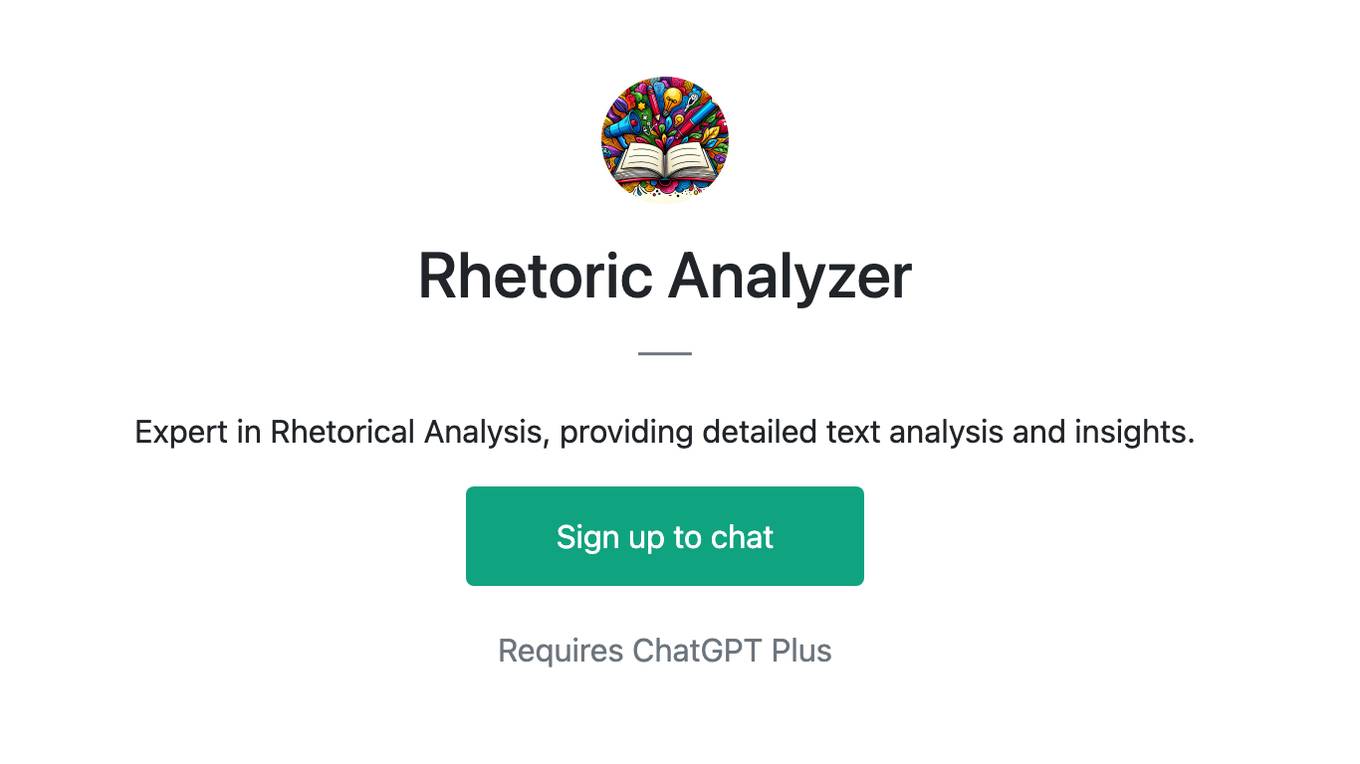
Rhetoric Analyzer
Expert in Rhetorical Analysis, providing detailed text analysis and insights.
